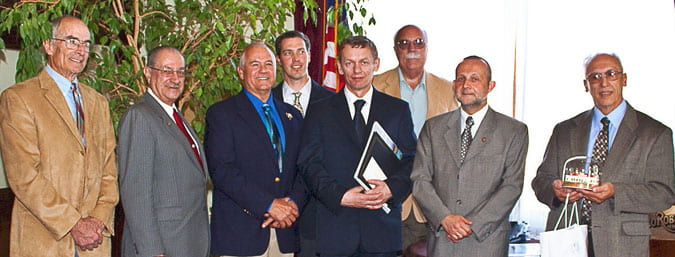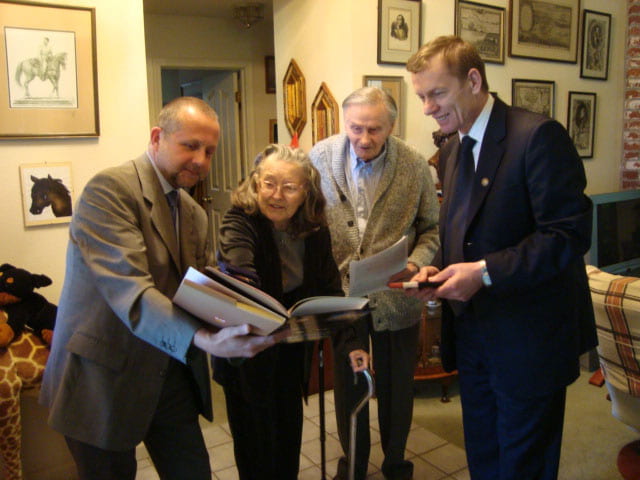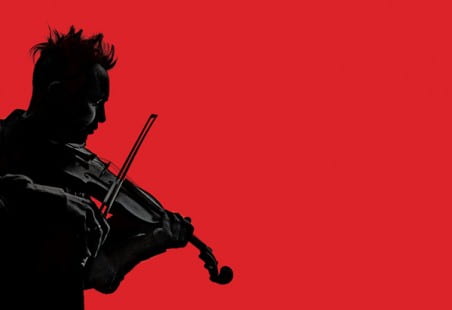Polish Music Center Newsletter Vol. 16, no. 6
PMC News
Tarnów Delegation In CA
A high-ranking delegation from the City of Tarnów and the Tarnów District paid an official visit to California during the last week of April 2010. The delegation included Mieczyslaw Kras, Supervisor of the Tarnów District, and Ryszard Żądło, President of Tarnów City Council. The two politicians paid an extended visit to the Central Coast town of Paso Robles, which over the past two years had become an important partner in a cultural exchange with the Province of Tarnów. The common denominator linking both communities is the person of Ignacy Jan Paderewski—one of the greatest pianists and Prime Minister of Poland after World War I—who was a landowner in Paso Robles as well as in the Province of Tarnów.
During an April 23 meeting in Paso Robles, the guests from Tarnów received official notes of condolences from the Paso Mayor and City Council following the tragic airplane accident near Katyń that resulted in deaths of the Poland’s President, First Lady and a number of high-ranking government officials. In his remarks, Paso’s Mayor, Duane Picanco, stressed the importance of the rapidly developing cultural and commercial links between Paso Robles and Tarnów. Joel Peterson, Director of the Paderewski Festival in Paso Robles, recalled in his speech the patronage of the Festival and its exchange program on the part of Poland’s First Lady, Maria Kaczyńska, who hosted American visitors for tea in the Presidential Palace in June of 2008.
 Polish guests also met with the Paso Robles’ Chamber of Commerce for an extended session that identified areas of possible future cooperation that include not only cultural projects but also commercial exchanges. During the coming months, lists of specific topics will be exchanged between the two partners. The American side is eager to export its wine-growing expertise to Tarnów, where viticulture is just beginning to take root. Export of art products, promotion of tourism and horseback holidays (popular in both communities) are on offer from the Tarnów side. Preliminary plans for Paso’s Chamber of Commerce visit in Tarnów were laid out for June 2011, when young pianists from Central Coast will again visit Tarnów for piano workshops and concerts at Paderewski’s former residence in Kąśna Dolna, as a part of the Youth Competition of the Paderewski Festival in Paso Robles.
Polish guests also met with the Paso Robles’ Chamber of Commerce for an extended session that identified areas of possible future cooperation that include not only cultural projects but also commercial exchanges. During the coming months, lists of specific topics will be exchanged between the two partners. The American side is eager to export its wine-growing expertise to Tarnów, where viticulture is just beginning to take root. Export of art products, promotion of tourism and horseback holidays (popular in both communities) are on offer from the Tarnów side. Preliminary plans for Paso’s Chamber of Commerce visit in Tarnów were laid out for June 2011, when young pianists from Central Coast will again visit Tarnów for piano workshops and concerts at Paderewski’s former residence in Kąśna Dolna, as a part of the Youth Competition of the Paderewski Festival in Paso Robles.
 On April 24 the Tarnów delegation visited Paderewski’s former ranch in Paso Robles. They were shown around the picturesque hillsides on Paso’s west side by Mr. Hy Blythe (pictured at right). Later, Mr. Kras and Mr. Żądło were hosted for lunch by Cri Cri Solak-Eastin, a member of the Paderewski Festival Board of Directors. That same evening, the delegation participated in a “Toast to Paderewski” and evening of wine tasting and music at the Pear Valley Winery. The event was a gala fundraiser for the cultural exchange program between Paso and Tarnów. Works by Paderewski, Chopin, Mozart, Bacewicz, and Dębski were performed by the LA-based Midnight Winds and pianist Marek Żebrowski. Consul General of the Republic of Poland, Madame Joanna Kozińska-Frybes (pictured at left with Supervisor Kras), was present at the concert and warmly spoke of the Festival and the cultural cooperation between two faraway places that are part of Paderewski’s admirable legacy. The Consulate General of the Republic of Poland in Los Angeles is an important partner and supporter of the budding exchange program.
On April 24 the Tarnów delegation visited Paderewski’s former ranch in Paso Robles. They were shown around the picturesque hillsides on Paso’s west side by Mr. Hy Blythe (pictured at right). Later, Mr. Kras and Mr. Żądło were hosted for lunch by Cri Cri Solak-Eastin, a member of the Paderewski Festival Board of Directors. That same evening, the delegation participated in a “Toast to Paderewski” and evening of wine tasting and music at the Pear Valley Winery. The event was a gala fundraiser for the cultural exchange program between Paso and Tarnów. Works by Paderewski, Chopin, Mozart, Bacewicz, and Dębski were performed by the LA-based Midnight Winds and pianist Marek Żebrowski. Consul General of the Republic of Poland, Madame Joanna Kozińska-Frybes (pictured at left with Supervisor Kras), was present at the concert and warmly spoke of the Festival and the cultural cooperation between two faraway places that are part of Paderewski’s admirable legacy. The Consulate General of the Republic of Poland in Los Angeles is an important partner and supporter of the budding exchange program.
The Tarnów delegation also visited with the families of young Central Coast pianists, who will host the two Polish pianists—Marian Michalski and Barbara Doroszuk—during their visit in California in mid-November, when the Paderewski Festival in Paso Robles will be held. Young American pianists, Rory McClish and Lindsay Reed, who visited Poland in June 2009 will now have a chance to welcome their Polish friends to Paso.
 On 27 April the Tarnów delegation paid an official visit to San Luis Obispo, where they were recognized with a special proclamation at the morning session of the County Board of Supervisors. Frank Mecham, Chairman of the San Luis Obispo Board of Supervisors, is a former mayor of Paso Robles who visited Poland in 2008 with the Paderewski Festival Board delegation.
On 27 April the Tarnów delegation paid an official visit to San Luis Obispo, where they were recognized with a special proclamation at the morning session of the County Board of Supervisors. Frank Mecham, Chairman of the San Luis Obispo Board of Supervisors, is a former mayor of Paso Robles who visited Poland in 2008 with the Paderewski Festival Board delegation.
Afterwards, the Polish guests continued their California visit in San Francisco, where they were hosted by Poland’s Honorary Consul, Christopher Kerosky. Several prominent members of Polish community in northern California were also present at the Consulate meeting co-organized by Caria Tomczykowska. A gala dinner afterwards closed the delegation’s visit in the Bay Area. The last item on the delegation’s agenda included a visit in Sacramento area with Anne Appleton-Strakacz, Paderewski’s goddaughter, who with her husband, Louis, hosted the Polish visitors to lunch at the local club.
Returning to Los Angeles, the Tarnów delegation was officially received by Yola Czaderska-Hayek and her husband in their residence, Belvedere, in Hollywood. After a brief exchange of gifts and picture taking, the delegation was invited to lunch in the heart of Hollywood, departing directly for the airport and their return to Poland on May 1.
Chopin & Paderewski Year
Chopin Open Festival
From June 11-13, the Chopin Open Festival features over 120 concerts and events related to the life and music of Frederic Chopin in one spot. 20 orchestras and numerous soloists from around the world will celebrate the 2010 Chopin Year as, for the first time in Warsaw, the Polish version of famous French festival La Folle Journée is presented. Chopin Open is an attractive and unconventional form of presentation of classical music, with an open and listener friendly concept and affordable ticket prices. During the festival the audience will be able to hear Chopin’s complete works performed live, even the lesser known chamber works.
 According to the artistic director of the festival, René Martin: “Presentation of all of the Chopin’s works will take 22 hours. And however revolutionary these hours might be there is just not enough of them for this festival, so I’ve assigned Chopin as the artistic director.”
According to the artistic director of the festival, René Martin: “Presentation of all of the Chopin’s works will take 22 hours. And however revolutionary these hours might be there is just not enough of them for this festival, so I’ve assigned Chopin as the artistic director.”
There will also be performances of works by Chopin acquaintances: Liszt, Schumann, Mendelssohn and Bellini. The audience will also hear works that Chopin himself performed in Warsaw. Since Chopin was a great admirer of Bach, Haendel and Mozart, some of the greatest works of these composers have been included in the program of the festival, including Bach’s Das Wohltemperierte Klavier, Haendel’s arias and, during the program reconstructing Chopin’s funeral, Mozart’s Requiem.Organizers have also included programs by composers who were strongly influenced by Chopin – Debussy, Scriabin, Rachmaninov, Ravel and Fauré.
The ensembles invited to perform in Warsaw include: Sinfonia Varsovia, Sinfonia Iuventus, Grand Theater-National Opera Orchestra, Musica Viva from Russia, Ricercar Consort from Belgium, Ensemble Vocal de Lausanne Choir, Levity Trio and Motion Trio. The soloists include: singers Barbara Hendricks and Olga Pasiecznik, pianists Boris Berezovsky, Anne Queffélec and Abdel Rahman El Bacha, harpsichordist Pierre Hantaï, and conductors Jacek Kaspszyk, Jerzy Maksymiuk, Marc Minkowski, Krzysztof Penderecki, George Tchitchinadze, Antoni Wit and Michel Corboz.
The concerts will take place in the Grand Theater-National Opera Theater and in a tent set up in the Theater Square. All the halls are named after episodes from French period of Chopin’s life: Fontana Hall, Delacroix Hall, George Sand Hall, Pleyel Hall, Nohant Hall and Pianopolis Hall. The audience will be able to participate in several concerts and freely move from hall to hall, in effect creating their own program.
La Folle Journée festival was first organized in the French city of Nantes in 1995. Shortly thereafter the following editions moved to Lisbon (2000), Bilbao (2002), Tokyo (2005) and Rio de Janeiro (2007). The concerts take place from morning to the evening in several halls in the same building and at the same time. Each of the concerts is usually no longer than an hour.
Fryderyk Chopin is the main theme of all of this year’s La Folle Journée. So far, the festival has visited Nantes (27 – 31 January), Bilbao (5 – 7 March), Niigata (30 April – 1 May), Tokyo (2 – 4 May), Kanazawa (3 – 5 May) and Biwako (2 May), totalling 221 concerts heard by 192,000 audience members. The festival will visit Rio de Janeiro (2 – 6 June) and then come to Warsaw.
The Warsaw Chopin Open festival is organized by Sinfonia Varsovia, Capital City of Warszawa and Ogrody Muzyczne Foundation, in cooperation with Grand Theater-National Opera and National Theater. For more information please visit www.chopinopen.pl.
[Source: culture.pl]
Chopin Statue In Vienna
 Krzysztof M. Bednarski’s Chopin statue project has won the closed competition for a Frederic Chopin statue to be erected in Vienna. The project, named “La note bleue” [Blue Note], entails a granite platform upon which sits a bronze cutout of Chopin’s portrait with a bronze bird flying nearby. The name of the sculpture relates to the words of George Sand, who always notice a “blue note” in the works of Chopin. At night the statue will be lit by a blue light, during the day it will cast moving shadows on the surrounding stones below.
Krzysztof M. Bednarski’s Chopin statue project has won the closed competition for a Frederic Chopin statue to be erected in Vienna. The project, named “La note bleue” [Blue Note], entails a granite platform upon which sits a bronze cutout of Chopin’s portrait with a bronze bird flying nearby. The name of the sculpture relates to the words of George Sand, who always notice a “blue note” in the works of Chopin. At night the statue will be lit by a blue light, during the day it will cast moving shadows on the surrounding stones below.
The competition was announced in March 2010 by the National Frederic Chopin Institute. Prepared by the International Chopin Society in Vienna with support from the Polish Embassy in Austria, the statue will commemorate the several times that Chopin visited Vienna between 1829-1831. The statue will be unveiled in the Fall of 2010 in the Schweizer Garten Park.
[Source: wyborcza.pl]
Chopin Statue In Żychlin
 A statue of young Frederic Chopin sitting on a bench will be created for the Palace Complex in Żychlin near Konin, Poland. The composer visited Żychlin in 1829, when he attended the wedding of Melania Bronikowska and Wiktor Adam Kurnatowski. En route from Vienna and accompanied by Ignacy Maciejowski and Alfons Brandt, Chopin traveled from Kalisz to Żychlin with the family of Dr. Bogumił Helbich.
A statue of young Frederic Chopin sitting on a bench will be created for the Palace Complex in Żychlin near Konin, Poland. The composer visited Żychlin in 1829, when he attended the wedding of Melania Bronikowska and Wiktor Adam Kurnatowski. En route from Vienna and accompanied by Ignacy Maciejowski and Alfons Brandt, Chopin traveled from Kalisz to Żychlin with the family of Dr. Bogumił Helbich.
The competition for the sculpture was won by Marcin Mielczarek, a sculptor from Łódź. His proposed artwork presents Chopin sitting on a low bench, which is similar to the benches set in gardens and parks to create places of solitude during Chopin’s era. The composition of the statue will utilize several different materials: granite, sandstone and bronze, among others. The statue will be unveiled in September 2010, during the main Chopin celebrations in the Konin region.
[Source: muzyka.onet.pl]
Diapason d’Or for “The Real Chopin”
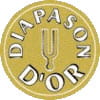 Two CDs from “The Real Chopin” series, published by the National Frederic Chopin Institute, have received the highest award of the French music magazine Diapason (May 2010 – no. 580). The Diapason d’Or Nouveautés Award was given to Chopin-Pieśni for songs recorded by Aleksandra Kurzak, Mariusz Kwiecień and Nelson Goerner. The Diapason D’Or Découverte Award was given to the recording of Chopin piano concertos performed by Jaś Lisiecki with the Sinfonia Varsovia orchestra, conducted by Howard Shelley.
Two CDs from “The Real Chopin” series, published by the National Frederic Chopin Institute, have received the highest award of the French music magazine Diapason (May 2010 – no. 580). The Diapason d’Or Nouveautés Award was given to Chopin-Pieśni for songs recorded by Aleksandra Kurzak, Mariusz Kwiecień and Nelson Goerner. The Diapason D’Or Découverte Award was given to the recording of Chopin piano concertos performed by Jaś Lisiecki with the Sinfonia Varsovia orchestra, conducted by Howard Shelley.
[Source: polmic.pl]
Chopin By Levity
 Levity – Chopin Shuffle
Levity – Chopin Shuffle
Levity Trio arrangements of Frederic Chopin’s 24 Preludes Op. 28
Levity Trio: Jacek Kita – piano; Piotr Domagalski – upright bass; Jerzy Rogiewicz – drums; Guest artists: Gaba Kulka, Tomasz Duda, Raphael Rogiński, Grzegorz Uzdański, and Toshinori Kondo
Universal Music Poland
June 11 marks the release of the 2nd album by the Levity Trio, entitled Chopin Shuffle. All compositions on both CDs were created by Levity based on Chopin’s Op. 28 preludes and maintaining the original order. Special guest on the recording is the outstanding Japanese trumpet player, Toshinori Kondo. Additionally guest appearances include: Gaba Kulka, Tomasz Duda, Raphael Rogiński and Grzegorz Uzdański. The album was produced and mixed by Marcin Bors, who received a 2009 Fryderyk award for his work on HEY’s album Miłość! Uwaga! Ratunku! Pomocy!.
In promotion of the new album, Levity will play two concerts, each with their own different program, at the Chopin Open Festival on June 13 at 4:15pm and 7:15pm. All guest artists, including Toshinori Kondo, will perform with the trio at the event.
[Sources: universalmusic.pl; culture.pl]
Chopin Jazz Recording
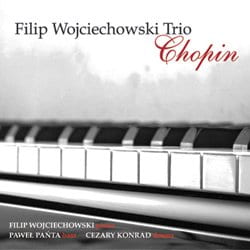 Chopin – Filip Wojciechowski Trio
Chopin – Filip Wojciechowski Trio
Chopin: Mazurka in A Minor Op. 68 no. 2; Prelude in G Major Op. 28 no. 3; Ballade in G Minor Op. 23; Waltz in E flat Major Op. 18; Etude in E Major Op. 10 no. 3; Etude in F Minor Op. 25 no. 2; Nocturne in F Major Op. 15 no. 1; Mazurka in D Major Op. 33 no. 2; Etude in E Minor Op. 10 no. 6
Filip Wojceichowski Trio: Filip Wojciechowski – piano; Paweł Pańta – bass; Cezary Konrad – drums
PRCD1310
According to a review by Piotr Iwicki (translated from the Polish Radio website):
“If you wanted to select one of the Polish piano virtuosos with the most versatility to perform swinging interpretations of the works of Frederic Chopin, the name of Filip Wojciechowski comes to mind first. A laureate of classical piano competitions (Claude Khan Competition – Paris and European Chopin Competition Darmstadt), including a Special Prize at the XIII International Chopin Piano Competition in Warsaw, he also is a laureate of some of the most important jazz competitions in Germany (Leverkusen) and Belgium (Hoeilart). This proves that the album recorded by Wojciechowski is competent both from the classical and jazz standpoints.
Filip Wojciechowski and his outstanding rhythm section, often called “the Polish dream section” including Czarek Konrad (drums) and Paweł Pańta (bass), seem to confirm with each note that the natural melodies of Chopin’s works of art are perfectly suitable to translate into the language of jazz. Wojciechowski […] entertains with beautiful music, seemingly winking at us: wouldn’t Chopin play his phrases this way if he had lived today and loved jazz? This love of jazz flowing out to the listener, combined with a respect for all the music, is apparent here, which makes this album a standout in the whole range Chopin jazz offerings. I will risk saying that it is the best.”
[Source: polskieradio.pl]
Chopin Book Awards
Most beautiful book of 2009
 The album by Mieczysław Tomaszewski, entitled Chopin and prepared by PWM and BOSZ Editions to celebrate the Chopin 2009-2010 anniversarires, has received an award in the “Album” category at the 50th “Most beautiful books of 2009” competition. Additionally, an honorary mention was given to Korespondencja F. Chopina t. I 1816-1821, edited by Zofia Helman, Zbigniew Skowron and Hanna Wróblewska-Straus and published by the Warsaw University.
The album by Mieczysław Tomaszewski, entitled Chopin and prepared by PWM and BOSZ Editions to celebrate the Chopin 2009-2010 anniversarires, has received an award in the “Album” category at the 50th “Most beautiful books of 2009” competition. Additionally, an honorary mention was given to Korespondencja F. Chopina t. I 1816-1821, edited by Zofia Helman, Zbigniew Skowron and Hanna Wróblewska-Straus and published by the Warsaw University.
 Organized by the Polish Society of Book Publishers, this 50th edition of the competition attracted 82 publishers submitting 158 titles for consideration, of which 83 received awards or honorary mentions. The awards were presented at a ceremony on May 14, 2010 at the Palace of Culture and Science in Warsaw, during the Warsaw Book Tradeshow.
Organized by the Polish Society of Book Publishers, this 50th edition of the competition attracted 82 publishers submitting 158 titles for consideration, of which 83 received awards or honorary mentions. The awards were presented at a ceremony on May 14, 2010 at the Palace of Culture and Science in Warsaw, during the Warsaw Book Tradeshow.
[Sources: ptwk.pl; pwm.com.pl]
Chopin Edition 2010 Competition
 The “Chopin Edition 2010” competition was announced to encourage publishers’ interest in the Chopin Year celebrations. The competition was open to all publishers with headquarters in Poland, who published Chopin related books and albums after January 1, 2009.
The “Chopin Edition 2010” competition was announced to encourage publishers’ interest in the Chopin Year celebrations. The competition was open to all publishers with headquarters in Poland, who published Chopin related books and albums after January 1, 2009.
 The awards were presented during a closing gala of the Warsaw Book Tradeshow at the Palace of Culture and Science in Warsaw. Lebanese soprano Nadin Nassar and the Włodzimierz Nahorny Sextet performed Chopin repertoire at the gala.
The awards were presented during a closing gala of the Warsaw Book Tradeshow at the Palace of Culture and Science in Warsaw. Lebanese soprano Nadin Nassar and the Włodzimierz Nahorny Sextet performed Chopin repertoire at the gala.
Having reviewed 22 titles submitted for the competition, the Jury of the Chopin Edition 2010 (Prof. Stanisław Moryto, Prof. Janusz Fogler, Tadeusz Górny, Tadeusz Nyczek, and Adam Rozlach) gave the following awards:
 First category: Children and Youth Publications – ZNAK editions from Kraków for Michał Rusinek’s Mały Chopin [Little Chopin]
First category: Children and Youth Publications – ZNAK editions from Kraków for Michał Rusinek’s Mały Chopin [Little Chopin]- Second Category: Popular Science – PIW editions for Adam Zamoyski’s Chopin książę romantyków [Chopin, Prince of the Romantics]
- Third category: Album Editions – BOSZ Editions/PWM Editions for Chopin by Mieczysław Tomaszewski and Władysław Pluta.
[Source: ptwk.pl]
Chopin Concerts In Łazienki Park
 The summertime Chopin concerts at the Royal Łazienki Park is the oldest running outdoor event in Warsaw—it has been in existence without interruption since 1959. This year, organizers once more were able to invite outstanding national and international artists to perform in the Park. Admission to all concerts is free.
The summertime Chopin concerts at the Royal Łazienki Park is the oldest running outdoor event in Warsaw—it has been in existence without interruption since 1959. This year, organizers once more were able to invite outstanding national and international artists to perform in the Park. Admission to all concerts is free.
The cycle was inaugurated on May 15, during museum night. The floating stage was beautifully lit and Michael Nyman, one world’s best known film composers, performed live with Poland’s successful accordion ensemble, Motion Trio. Some outstanding photos from the event are available at estrada.com.pl.
The following day marked the beginning of the traditional Łazienki concerts. At noon, Janusz Olejniczak performed a recital, followed by Stanisław Drzewiecki at 4 pm.
From May until September there will be 40 concerts every Sunday at noon and 4 pm. Alongside to the composer’s statue will perform such artists as: Igor Lovchinsky, Dina Joffe, Wojciech Świtała, Daniel Vaiman, Marek Drewnowski, Mark Laforet, Paweł Giliłow, Alberto Nose, and Kevin Kenner, among others
Some of the concerts will be webcast live thanks to the cooperation with www.Istream.pl. Concert information is available at koncertychopinowskie.pl and at www.estrada.com.pl.
[Sources: muzyka.onet.pl; estrada.com.pl]
Chopin In Beijing
 The concert entitled “Different Faces of Chopin” opened the Polish Culture Days in China. The concert was led by pianist Paweł Lis and included performances by the Camerata Silesia Choir, Andrzej Jagodziński Trio and Maria Pomianowska’s Polish Ensemble.
The concert entitled “Different Faces of Chopin” opened the Polish Culture Days in China. The concert was led by pianist Paweł Lis and included performances by the Camerata Silesia Choir, Andrzej Jagodziński Trio and Maria Pomianowska’s Polish Ensemble.
The goal of the concert was to present the music of Chopin, as a source of inspiration and artistic re-interpretations. The concert was opened with a classical segment with musical narration by Paweł Lis, introducing the Chinese audience members to a journey of sounds and images inspired by Chopin’s music. Next, the Camerata Silesia Choir performed vocal interpretations of Chopin’s compositions. Then the Andrzej Jagodziński Trio performed jazz interpretations of Chopin’s works. The concert concluded with folk arrangements of Chopin’s music performed by the Maria Pomianowska’s Polish Ensemble. The concert was performed at the Mei Lanfang Theater and was enhanced by projected visuals and computer animations created by Mariusz Grzegorzek.
“Different Faces of Chopin” were repeated on May 21 at the Jinwan Grand Theater in Tianjin. Both concerts inaugurated the Days of Polish Culture in China, prepared by Adam Mickiewicz Institute in correlation with the EXPO 2010 in Shanghai.
[Source: wiadomosci.wp.pl]
Chopin And Rubinstein In Paris
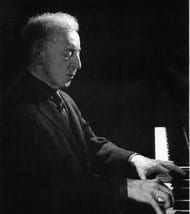 The Artur Rubinstein Foundation in Łódź has organized a three day event in Paris dedicated to the work of Frederic Chopin and Artur Rubinstein. During the inauguration there was a presentation of portraits and photographs of Rubinstein, mostly created by his daughter, Ewa.
The Artur Rubinstein Foundation in Łódź has organized a three day event in Paris dedicated to the work of Frederic Chopin and Artur Rubinstein. During the inauguration there was a presentation of portraits and photographs of Rubinstein, mostly created by his daughter, Ewa.
 According to the chairman of the Artur Rubinstein Foundation, Wojciech Grochowalski, Rubinstein was very much loved in Paris, and France was one of his favorite countries. He had always wanted to live in Paris and, like Chopin, he spent almost half of his life in this city.
According to the chairman of the Artur Rubinstein Foundation, Wojciech Grochowalski, Rubinstein was very much loved in Paris, and France was one of his favorite countries. He had always wanted to live in Paris and, like Chopin, he spent almost half of his life in this city.
The main event of the short celebrations was a concert on May 26 at the famous Salle Gaveau in Paris. Marek Drewnowski performed Chopin’s Piano Concerto in F Minor. He also accompanied singer Joanna Woś, who sang Chopin songs and an aria by Bellini. The Salle Gaveau also housed an exhibition about Frederic Chopin, Artur Rubinstein, Łódź and Poland.
[Source: wiadomosci.wp.pl]
News
Polska! Year Ends / Bauer Premiere
 Over a year since it kicked off in April 2009, the celebration of Polish culture and arts that has been the UK’s Polska!Year is drawing to a close. Over the course of the year, more than 200 events were held in 26 cities throughout the UK, often creating new collaborative relationships between British and Polish organizers and artists and opening the eyes and ears of many audience members. The culminating musical events of this monumental cultural exchange include Nigel Kennedy’s Polish Weekend (May 29-31), the Polish Jazz Focus (June 2, 5 & 9), and a spotlight on Poland at the St. Magnus Festival (June 18-23).
Over a year since it kicked off in April 2009, the celebration of Polish culture and arts that has been the UK’s Polska!Year is drawing to a close. Over the course of the year, more than 200 events were held in 26 cities throughout the UK, often creating new collaborative relationships between British and Polish organizers and artists and opening the eyes and ears of many audience members. The culminating musical events of this monumental cultural exchange include Nigel Kennedy’s Polish Weekend (May 29-31), the Polish Jazz Focus (June 2, 5 & 9), and a spotlight on Poland at the St. Magnus Festival (June 18-23).
Nigel Kennedy’s Polish Weekend was held in London’s Southbank Centre from May 29-31and included a wide range of musical performances, from jazz to Polish breakdancing to Chopin. Organized by the event’s Artistic Director, Nigel Kennedy—the British violinist who has made Poland his second home—the weekend featured the UK debut performance of Kennedy’s own orchestra, the Orchestra of Life, as well as Nigel Kennedy’s Chopin Super Group, Kennedy’s exciting World Cup Project, and the Nigel Kennedy Quintet. Other performers on the program were: the exquisite trumpet player Robert Majewski and his special guests performed the music of Krzysztof Komeda; Zakopower, one of the hottest music bands on the Polish music scene, brought their energetic combination of Polish folk, electronic and pop music to the stage; Piotr Wylezol, pianist for the Nigel Kennedy Quintet, performed with his own Piotr Wylezol Quintet; Nigel Kennedy joined forces with klezmer band Kroke; Polish jazz superstar Anna Maria Jopek and her band made a rare appearance in London; and great Polish jazz guitarist Jarek Śmietana performed with his Quartet. Hear a report from Polish Radio’s Michał Kubicki at thenews.pl
During the Polish Jazz Focus series, famous Polish jazz and classical musicians will perform in one of the world’s most prestigious music centres – “The Sage” in Gateshead, England. On Wednesday, June 2, Anna Maria Jopek will join the Nigel Kennedy Quintet for unique evening of accessible Polish jazz. On Saturday, June 5, Jan Kopinski and his group REFLEKTOR will present their multi-media program “MIRRORS,” exploring themes of displacement, sense of belonging and diffused memory, prompted by notions of identity and loss. Then, on Wednesday, June 9, the Marcin Wasilewski Trio (Wasilewski – piano, Slawomir Kurkiewicz – bass, and Michal Miskiewicz – drums) bring their almost telepathic group dynamic and irresistible rhythmic momentum to the stage.
In honor of the 200th anniversary of the birth of Fryderyk Chopin, Poland will be the special guest of the British contemporary music festival at St Magnus in Orkney. More than a dozen concerts will be performed by renowned Polish musicians, as well as music by Polish composers performed by British ensembles and soloists, between June 18 and 23, 2010. Polish performers include: Bester Quartet, Royal String Quartet, Ewa Kupiec – piano, Karbido, Andrzej Bauer – cello, Trebunie Tutki, Michal Dworzyński – conductor, Olga Pasichnyk – soprano, Natalya Pasichnyk – piano, Leszek Możdzer – jazz piano, Jan Krzysztof Broja – piano, and Michał Dworzyński – conductor.
Polish music on the program includes: Bacewicz – Sonata no. 2; Andrzej Bauer – Frattoriale (World Première – June 23 in King Street Halls, feat. Bauer and Broja); Chopin – Piano Concerto no.2 (piano & string quartet version) Grande Valse (arr. Stravinsky), Scherzo in C minor, op. 39, Four Mazurkas, op. 41, Waltz in Ab major, op. 42, Tarantella in Ab major, op.43, Polonaise in F minor, op.44, Two Nocturnes, op. 48, Cello Sonata in G minor, op 65, and Fantasie in F minor, op. 49; Górecki – String Quartet no. 3 ‘…songs are sung’; Karłowicz – Symphonic Prologue from Music for the White Dove; Aleksander Kościow – Osse Ore Oculo; Lutosławski – Mała Suita (3rd and 4th movements), Chantefleurs et Chantefables and Dance Preludes; Paderewski – Nocturne (arr. A. Bauer); Paweł Mykietyn – Three for Thirteen; Szymanowski – String Quartet no.1 and Violin Concerto no. 1.
[Sources: thenews.pl; polskayear.pl; polskayear.pl; polskayear.pl]
Zubel & Nowak World Premieres
The Grand Theater-National Opera has presented two new operas as part of the “Terytoria” cycle on the Chamber Stage. Aleksander Nowak’s Sudden Rain and Agata Zubel’s Between were premiered on May 13, 2010.
With the “Terytoria” cycle, the Polish National Theater- Grand Opera invites the most interesting artists in the fields of theater, music and visual arts to search for new aesthetic qualities and forms of expression. The cycle is an attempt to create new artistic directions and emancipate entrenched connotations and visions of what is art.
 Aleksander Nowak’s one-act chamber opera Sudden Rain is written for soprano, baritone, mixed choir and chamber orchestra, based on a libretto by Anna Konieczna and Aleksander Nowak. It tells a story of the crossing over between intentions and actions. With his music Nowak, creates the two characters of a married couple and leads the viewer to an unexpected finale.
Aleksander Nowak’s one-act chamber opera Sudden Rain is written for soprano, baritone, mixed choir and chamber orchestra, based on a libretto by Anna Konieczna and Aleksander Nowak. It tells a story of the crossing over between intentions and actions. With his music Nowak, creates the two characters of a married couple and leads the viewer to an unexpected finale.
 Agata Zubel’s Between is a cross-genre exploration of the forms of opera and ballet, scored for voice, electronics and dancers. Live musicians are replaced by pre-recorded and spatially arranged electronic layer for 6 speakers surrounding the audience. Only the solo female voice is performed live, creating emotions, and navigating the successive visual or dance actions.
Agata Zubel’s Between is a cross-genre exploration of the forms of opera and ballet, scored for voice, electronics and dancers. Live musicians are replaced by pre-recorded and spatially arranged electronic layer for 6 speakers surrounding the audience. Only the solo female voice is performed live, creating emotions, and navigating the successive visual or dance actions.
[Source: pwm.com.pl; teatrwielki.pl]
Warsaw Musical Meetings Premieres
 The “Warszawskie Spotkania Muzyczne” [Warsaw Musical Meetings] Festival is an annual music festival that takes place in venues around Warsaw. WSM encompasses a very broad range of genres, including ancient music to contemporary works and featuring both established composers as well as those less known. Established in 1986, it is organized by the Warsaw chapter of Polish Composer’s Union [ZKP] with the help of Polish Radio II, the Mazovian Center for Culture and Art, and Warsaw Royal Castle.
The “Warszawskie Spotkania Muzyczne” [Warsaw Musical Meetings] Festival is an annual music festival that takes place in venues around Warsaw. WSM encompasses a very broad range of genres, including ancient music to contemporary works and featuring both established composers as well as those less known. Established in 1986, it is organized by the Warsaw chapter of Polish Composer’s Union [ZKP] with the help of Polish Radio II, the Mazovian Center for Culture and Art, and Warsaw Royal Castle.
Every year, the Festival features several world premiere performances. During this year’s Festival (May 9-16), the following premieres took place:
- Iwona Kisiel – 5 Pieśni [5 Songs]for soprano and piano, to the words of Marii Pawlikowskiej-Jasnorzewskiej (2009). Performed by soprano Anna Karasińska on May 10 in the Polish Radio Witold Lutosławski Studio.
- Zbigniew Penherski – Lamentacje [Lamentations] for baritone or countertenor and string quartet, to selected fragments from the Book of Jeremiah (2003). Performed by countertenor Jan Jakub Monowid and the Kwartet Wilanów on May 13 in the Great Hall of the Royal Castle.
- Paweł Strzelecki Fanfara [Fanfare] for organ (2008). Performed by organist Maria Erdman on May 14 in the Reform Evangelical Church.
[Source: wsm.art.pl]
Krzesimir Dębski: World Premieres
 Two new works by Polish composer and conductor, Krzesimir Dębski, were recently premiered in concerts throughout Poland. Organismi transcendentali for Piano and Orchestra was given its world premiere in Poznań on May 6 in University Hall. Pianist Julia Samojło presented a dashing interpretation of this daunting and complex work that was recently recast by the composer from a solo piano composition to an imposing work for piano and orchestra. The Poznań Philharmonic Orchestra splendidly rose to the task, which celebrated their 55th anniversary, under the spirited baton of the composer.
Two new works by Polish composer and conductor, Krzesimir Dębski, were recently premiered in concerts throughout Poland. Organismi transcendentali for Piano and Orchestra was given its world premiere in Poznań on May 6 in University Hall. Pianist Julia Samojło presented a dashing interpretation of this daunting and complex work that was recently recast by the composer from a solo piano composition to an imposing work for piano and orchestra. The Poznań Philharmonic Orchestra splendidly rose to the task, which celebrated their 55th anniversary, under the spirited baton of the composer.
The concert opened with several compositions by Władysław Szpilman, including Introdukcja do filmu [Introduction to a Film], Mała uwertura [Small Overture], Walc w starym stylu [Waltz in an Old Style], and Concertino for Piano and Orchestra, also performed by Samojło. Music by Henryk Wars [Henry Vars] closed the evening’s program. Wars’ Piano Concerto (1950) is a single-movement work in a post-romantic style, written with great deal of panache and skill for the soloist and orchestra. It was performed by pianist and PMC Director, Marek Żebrowski, who also furnished an encore of his own Variations for Piano and Orchestra on a theme from Henryk Wars’ most popular song, Miłość ci wszystko wybaczy [Love Forgives All], keeping to the official title of the concert. The same program was repeated on May 7 and, on both evenings, the sold out concerts were warmly received by the public.

The other world premiere of music by Dębski was held on 22 May in the Gothic Cathedral of Frombork, a town on the edge of the Baltic Sea, associated with the famous Polish astronomer, Copernicus. After many years of archeological research and DNA testing, a previously unmarked grave of the great scientist was discovered, his remains positively identified and buried in a special ceremony at the Cathedral. (See next article for details on Copernicus and the burial ceremony)
A concert of Mozart’s Requiem and Dębski’s Cosmopolis—a work for soloists, chorus and orchestra commissioned for the occasion—concluded this solemn event. The soloists included Bożena Harasimowicz, soprano, Anna Lubańska, mezzo-soprano, Konrad Włodarczyk, tenor, and Wojciech Gierlach, bass. The Toruń Symphony Orchestra and the Astolabium Choir were led by Piotr Sułkowski in the Mozart, and Krzesimir Dębski conducted the performers in his Cosmopolis. The concert was attended by the highest officials of the local government and Catholic Church of Poland, as well as representatives from the Kaliningrad District of the neighboring Russian Federation and Warmia & Mazury University, and various scientists involved in the research leading to the discovery of Copernicus’ remains.
The free concert was a gift of the City of Toruń (where Copernicus was born) to the City of Frombork (where the astronomer had worked and died). His new resting place is in the nave of the Cathedral at the altar of the Holy Cross. An impressively-sized 10-foot high tombstone will be plainly visible to all future visitors of Copernicus’ grave.
[MZ]
[Source: frombork.pl]
Kopernik Rhapsody Premiere
To celebrate the most famous citizen of Olsztyn, the great astronomer Nicolaus Copernicus [Mikołaj Kopernik], Prof. Lucjan Marzewski has composed his Kopernik Rhapsody. The composition was created for the occasion of the re-burial of the astronomer, which took place on May 22, 2010 in Frombork. The premiere of the work took place a few days earlier, on May 19 in Olsztyn.
 Prof. Lucjan Marzewski is a long-time Director of the Music Institute of the Warmia-and-Mazury Univeristy, as well as a composer of music to over 100 plays, 60 chamber compositions and instrumental and popular music. The Rhapsody is a musical illustration of Nicolaus Copernicus’s activity in Warmia. Copernicus’s travels around the region in the 16th century are well documented and inspired a large format vocal-instrumental composition, however the composer translated that format into a chamber setting, using only 6 performers.
Prof. Lucjan Marzewski is a long-time Director of the Music Institute of the Warmia-and-Mazury Univeristy, as well as a composer of music to over 100 plays, 60 chamber compositions and instrumental and popular music. The Rhapsody is a musical illustration of Nicolaus Copernicus’s activity in Warmia. Copernicus’s travels around the region in the 16th century are well documented and inspired a large format vocal-instrumental composition, however the composer translated that format into a chamber setting, using only 6 performers.
The Rhapsody is a five part composition, with each part dedicated to a different period of astronomer’s life. Marzewski uses various expressive techniques, from ancient to neoclassical to contemporary. The composition uses fragments of poetry by Copernicus, Władysław Broniewski, and Tadeusz Śliwiak.
Nicolaus Copernicus lived in the Warmia region for 40 years and died at the age of 70 in Frombork. Having died in obscurity before the truly revolutionary nature of his discoveries were understood, Copernicus was buried in an unmarked grave on May 24, 1543 in the Frombork Arch-Cathedral. Later he would be condemned by the Catholic Church as a heretic, but then subsequently absolved and reinstated as the founder of modern heliocentric theory. Recently, the astronomer’s remains were identified, thanks to a search instigated by a local Catholic bishop in 2004. After a tour of several regional cities associated with Copernicus’s life, on May 22 his remains were consecrated by Józef Kowalczyk, the Papal Nuncio and newly named Primate of Poland, and Archbishop Wojciech Ziemba, and were re-buried in the original place of rest.
[Source: rmfclassic.pl; news.yahoo.com]
Aleksander Lasoń: World Premiere
 The “Mikołów Days of Music” Festival opened on May 22 with a premiere of a work by Polish composer Aleksander Lasoń, entitled hyMMny and commissioned by the Festival. It was performed by the Polish Radio Symphony Orchestra (NOSPR) and flautist Jadwiga Kotnowska, under the direction of Łukasz Borowicz, conductor. Also on the program was music by C.P.E. Bach, Francois Borne, and Ludwig van Beethoven.
The “Mikołów Days of Music” Festival opened on May 22 with a premiere of a work by Polish composer Aleksander Lasoń, entitled hyMMny and commissioned by the Festival. It was performed by the Polish Radio Symphony Orchestra (NOSPR) and flautist Jadwiga Kotnowska, under the direction of Łukasz Borowicz, conductor. Also on the program was music by C.P.E. Bach, Francois Borne, and Ludwig van Beethoven.
Established in 1991, the “Mikołów Days of Music” Festival (May 22- June 12) is celebrating its 20th anniversary this year. In this celebratory year as in all others, the festival has invited artists of the highest quality, among them: pianist Garrick Ohlson (USA), organist Johannes Strobl (Austria), Musica Florea Ensemble (Czech Republic), organist Alessandro Bianchi (Italy), pianist Krzysztof Jabłoński (Poland), and baritone Vladimit Chmelo (Czech Republic). Conductors include Krzysztof Penderecki, Jacek Kaspszyk, Massimiliano Caldi and Łukasz Borowicz.
[Source: mdm.mikolow.eu; pwm.com.pl]
Legawiec World Premiere/ Chopin & IJP Concert
The distinguished pianists Paul Kueter and Carolle-Ann Mochernuk and violinist/composer Walter Legawiec celebrated the 2010 bicentennial for Frederic Chopin and Robert Schumann and commemorated the sesquicentennial ofIgnacy Jan Paderewski with a concert on Sunday, May 16, 2010 at 3 p.m. at the Community Presbyterian Church in Mountainside, New Jersey. During the concert, Serenade for Piano by Mr. Legawiec was given its world premier. The composition was written to the poetry of Karol Wojtyla, Pope John Paul II, who thanked Mr. Legawiec in a letter from the Vatican for the musical setting of his poems.
Walter Legawiec, a Juilliard graduate, has performed through the years with Paul Kueter and Carolle-Ann Mochernuk in many concerts throughout the east. The Cracow Opera Foundation in Poland has recorded his chamber and orchestral music (see here). Grzegorz Fitelberg, renowned Polish composer and conductor, was Mr. Legawiec’s mentor and great inspiration. The relationship and collaboration of Kueter, Mochernuk and Legawiec has resulted in many rewarding performances throughout the eastern US that presented the classical repertoire of the great composers, in addition to new music.
Piotr Moss: US Premiere
 The American premiere of Piotr Moss’ Stabat Mater for mezzo-soprano, mixed chorus and eight cellos took place as a part of the Seasonal Concert Series at the Holy Trinity Episcopal Church in New York City on May 15, 2010. The performance was given by mezzo-soprano Rachel Calloway and the Cantori New York cello ensemble, under the direction of conductor Mark Shapiro. The program also included works by Arvo Part (US premiere), Felipe Perez-Santiago and Erol Gurol.
The American premiere of Piotr Moss’ Stabat Mater for mezzo-soprano, mixed chorus and eight cellos took place as a part of the Seasonal Concert Series at the Holy Trinity Episcopal Church in New York City on May 15, 2010. The performance was given by mezzo-soprano Rachel Calloway and the Cantori New York cello ensemble, under the direction of conductor Mark Shapiro. The program also included works by Arvo Part (US premiere), Felipe Perez-Santiago and Erol Gurol.
[JH]
Polish Music Board Elections
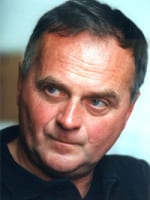 On May 20, during the meeting of the Polish Music Board at the Warsaw Music University, an administration election took place. Organization members once again elected Dr. Krzysztof Knittel, composer and professor, as the chairman of the board. The members of administration include: Joanna Wnuk-Nazarowa – Director of the National Polish Radio Orchestra, Previous Minister of Culture; Adrianna Poniecka-Piekutowska – Director of Krzysztof Penderecki Music Center; Viola Łabanow – Chairman of “Muzyka jest dla wszystkich” [Music is for Everyone] Foundation; Elżbieta Markowska – vice-chairman of De Musica, previous director of Polish Radio Chanel 2; Grzegorz Michalski – chairman of the Witold Lutosławski Society; and Jan Kaliszewski – chairman of Jeunesses Musicales Poland.
On May 20, during the meeting of the Polish Music Board at the Warsaw Music University, an administration election took place. Organization members once again elected Dr. Krzysztof Knittel, composer and professor, as the chairman of the board. The members of administration include: Joanna Wnuk-Nazarowa – Director of the National Polish Radio Orchestra, Previous Minister of Culture; Adrianna Poniecka-Piekutowska – Director of Krzysztof Penderecki Music Center; Viola Łabanow – Chairman of “Muzyka jest dla wszystkich” [Music is for Everyone] Foundation; Elżbieta Markowska – vice-chairman of De Musica, previous director of Polish Radio Chanel 2; Grzegorz Michalski – chairman of the Witold Lutosławski Society; and Jan Kaliszewski – chairman of Jeunesses Musicales Poland.
The meeting also set out the most urgent goals of the Polish Music Board, including: actions leading toward the reform of general music education; further development of music education standards; actions toward Poland’s ratification of UNESCO’s “Five Music Laws;” and actions toward creating a Polish Music Institute.
[Sources: polmic.pl, photo: filmweb.pl]
European Music Centre In Poland
 The long-awaited European Music Centre, the brain-child of world famous Polish composer and conductor Krzysztof Penderecki, has finally been awarded the fund necessary for construction. According to the international news service of Polskie Radio:
The long-awaited European Music Centre, the brain-child of world famous Polish composer and conductor Krzysztof Penderecki, has finally been awarded the fund necessary for construction. According to the international news service of Polskie Radio:
“The Ministry of Culture and National Heritage has given the go-ahead to allocate 50 million zloty (around 1.2 million euro) from the European Union’s operational programme ‘Infrastructure and Environment’ for the construction of the Krzysztof Penderecki European Music Centre in Lusławice, southern Poland.
Located close to the famous composer’s estate, it is to serve as a training centre for young instrumentalists, singers and conductors from across Europe. The project comprises a concert hall with an auditorium for 550 people, rehearsal rooms and hotel facilities.
Krzysztof Penderecki, who was present during the signing of the financial agreement at the Ministry, said that this was a fulfilment of his dreams.
Construction work is to commence later this year and the Centre is to [be] completed by the end of 2012.” [mk]
[Source: thenews.pl]
Mickiewicz Inst. Anniversary
 The Adam Mickiewicz Institute is the international arm of the Polish Ministry of Culture and National Heritage. In celebration of its 10th anniversary, the Adam Mickiewicz Institute has prepared a two day performance festival in Warsaw. The festival combines classical, alternative, rock, jazz, folk, and avant-garde music with street theatre shows and puppet theatre presentations by artists who promote Poland through their art. The festival will take place in Warsaw on June 11 and 12. Among the invited guests are: Levity, Julia Marcel, The Car is on Fire, The Poise Rite, Pustki, Mitch&Mitch, Teatr Biuro Podróży, Mosaic, Silesian Quartet, Wrocławski Teatr Lalek, Pink Freud, Oszibarack, and Teatr KTO.
The Adam Mickiewicz Institute is the international arm of the Polish Ministry of Culture and National Heritage. In celebration of its 10th anniversary, the Adam Mickiewicz Institute has prepared a two day performance festival in Warsaw. The festival combines classical, alternative, rock, jazz, folk, and avant-garde music with street theatre shows and puppet theatre presentations by artists who promote Poland through their art. The festival will take place in Warsaw on June 11 and 12. Among the invited guests are: Levity, Julia Marcel, The Car is on Fire, The Poise Rite, Pustki, Mitch&Mitch, Teatr Biuro Podróży, Mosaic, Silesian Quartet, Wrocławski Teatr Lalek, Pink Freud, Oszibarack, and Teatr KTO.
For more information about the Adam Mickiewicz Institute as well as detailed program of the celebrations, please visit www.iam.pl.
[Source: iam.pl]
Lutosławski Book
 Musica Iagellonica has published a book by Małgorzata Sułek entitled Pieśni masowe Witolda Lutosławskiego w kontekście doktryny realizmu socjalistycznego [Witold Lutosławski’s Mass Songs in the context of doctrins of social realism].
Musica Iagellonica has published a book by Małgorzata Sułek entitled Pieśni masowe Witolda Lutosławskiego w kontekście doktryny realizmu socjalistycznego [Witold Lutosławski’s Mass Songs in the context of doctrins of social realism].
The publisher’s website states: “Soc-realistic works have not played a major role in the output of Lutosławski for two reasons: firstly, he wrote only a few mass songs, secondly, he did not consider them to be valuable and treated writing them as the “necessary evil.” It is not a surprise then that there is not very much written about the mass works of Lutosławski. The goal of the book, in addition to analysis and criticism of the artistic merit of those works, is to collect all available information spread over numerous sources, to correct misleading information and to show those works against the backdrop of other works created in Polish culture and inspired by social realism. The analysis encompasses all of Lutosławski’s Mass Songs, both published by PWM and Czytelnik as well as the ones that survive only as manuscripts in the Paula Sachera Foundation archives in Basel.”
For more about the book, please visit the Musica Iagellonica website.
[Source: lutoslawski.org.pl]
Naxos Distributes CD Accord

 According to a Naxos press release from April 19, 2010, Naxos Records will now be the distributor of recordings made by CD Accord. The award-winning label CD Accord was established in 1995 and records the most distinguished Polish composers, soloists, chamber ensembles, symphony orchestra and choruses. Important repertoire for the company includes music by Jarzębski, Chopin, Wieniawski, Moniuszko, Karłowicz, Szymanowski, Bacewicz, Lutosławski, Panufnik, Penderecki, Kilar, Górecki and Szymański. To view the CD Accord Catalogue on Naxos, visit www.naxos.com/labels/cdaccord-cd.htm.
According to a Naxos press release from April 19, 2010, Naxos Records will now be the distributor of recordings made by CD Accord. The award-winning label CD Accord was established in 1995 and records the most distinguished Polish composers, soloists, chamber ensembles, symphony orchestra and choruses. Important repertoire for the company includes music by Jarzębski, Chopin, Wieniawski, Moniuszko, Karłowicz, Szymanowski, Bacewicz, Lutosławski, Panufnik, Penderecki, Kilar, Górecki and Szymański. To view the CD Accord Catalogue on Naxos, visit www.naxos.com/labels/cdaccord-cd.htm.
[Source: naxos.com]
Opera At The Stadium
 Wrocław Opera is preparing an open air staging of Puccini’s Turandot. For the first time in Poland the opera stage will be set in a sports arena, the Wrocław Olympic Stadium. Michał Znaniecki, who among others has worked with Placido Domingo, is responsible for this stage adaptation.
Wrocław Opera is preparing an open air staging of Puccini’s Turandot. For the first time in Poland the opera stage will be set in a sports arena, the Wrocław Olympic Stadium. Michał Znaniecki, who among others has worked with Placido Domingo, is responsible for this stage adaptation.
The production includes international guest stars tenors Luis Chapa (Mexico) and David Righeschi (Italy), and in the title role, Hungarian soprano Georgina Lukacs. There will be a total of 500 performers involved in the monumental production, including soloists, choir, ballet and over 200 extras.
This Wrocław Opera Superproduction is a huge challenge for the organizers. Among others the power requirements to supply all the lighting and sound required for quality performance is equal to the needs of a city of 20 thousand people. Over the course of the performances on June 18-20, 40,000 people will be in attendance.
[Sources: rmfclassic.pl; opera.wroclaw.pl]
Warszynski Plays “Marcia Funebre” In Edmonton
 Montreal-based concert pianist Mikolaj Warszynski will return to his home city Edmonton to perform the Piano Recital “Marcia Funebre”. This performance is dedicated to the Polish people tragically lost in the April 10 plane crash on their way to pay tribute to the victims of the Katyń massacre. The concert will be presented on Sunday, June 13, 2010, at 19:30, at All Saints’ Anglican Cathedral, located at 10035 – 103 Street. Admission free, donations welcome, reception to follow.
Montreal-based concert pianist Mikolaj Warszynski will return to his home city Edmonton to perform the Piano Recital “Marcia Funebre”. This performance is dedicated to the Polish people tragically lost in the April 10 plane crash on their way to pay tribute to the victims of the Katyń massacre. The concert will be presented on Sunday, June 13, 2010, at 19:30, at All Saints’ Anglican Cathedral, located at 10035 – 103 Street. Admission free, donations welcome, reception to follow.
The program will feature three compositions, each with a funeral march: L. van Beethoven– Sonata in A-flat major, Op. 26; F. Chopin – Sonata No. 2 in b-flat minor, Op. 35; and K. Szymanowski – Variations on a Polish folk theme in b-minor, Op. 10
Called “a major talent… a marvelous mixture of modesty and charisma” by CJSR Radio, Mikolaj Warszynski always obtains a welcome reception from the Edmonton community for his incredible musicality and captivating interpretations. He is originally from Edmonton, where he studied with the legendary Marek Jablonski at U of A, continued his music education in Rotterdam, Holland; Salzburg, Austria; Aspen, USA; at The Banff Centre for the Arts, and recently in Montreal where he is completing his doctorate degree in piano performance at Université de Montreal. Mikolaj has played concerts as a soloist and in chamber ensembles in Canada, Austria, Holland, Poland, and USA. For more information please visit: www.warszynski.com.
Kletzki On The Air
 In June, the “Discoveries from the Fleisher Collection” program on WRTI 90.1 FM Philadelphia will feature the music of Paul Kletzki. Kletzki’s skills as a conductor are recognized by cognoscenti the world over yet, despite the fact that he primarily saw himself as a composer, Kletzki’s compositions are much less known.
In June, the “Discoveries from the Fleisher Collection” program on WRTI 90.1 FM Philadelphia will feature the music of Paul Kletzki. Kletzki’s skills as a conductor are recognized by cognoscenti the world over yet, despite the fact that he primarily saw himself as a composer, Kletzki’s compositions are much less known.
In the first program on Saturday, June 5 from 5:00-6:00 p.m., program host Kile Smith will explore Kletzki’s Piano Concerto in D minor, Op. 22 (1930), orch. John Norine, performed by Joseph Banowetz, piano, with the Russian Philharmonic Orchestra and Thomas Sanderling, cond. Also on the program: Johannes Brahms – Symphony No. 1, Op. 68, Adagio sostenuto (2nd movement) (1862-76) performed by the Berlin Philharmonic and Wilhelm Furtwängler, cond. Listen online at www.wrti.org.
Paul Kletzki was born Paweł Klecki in Łódż, Poland in1900 and died unexpectedly in Liverpool in 1973. As a child prodigy of the violin, he became the youngest member of the Łódż Philharmonic at 15, but his performance career was interrupted by WWI. He went on to a flourishing career as a world renown conductor. For an interesting summary of Kletzki’s life, see the WRTI website. Bios of Kletzki are also available at polmic.pl, naxos.com and allmusic.com.
The Discoveries from the Fleisher Collection program on WRTI 90.1 FM uncovers the unknown, rediscovers the little-known, and takes a fresh look at some of the remarkable treasures housedin the Fleisher Collection of Orchestral Music, at the Parkway Central Library of the Free Library of Philadelphia.The Fleisher Collection is the largest lending library of orchestral performance material in the world.
[Sources: naxos.com; publicbroadcasting.net]
History Of Polish Music On Air
From May 10 – 14, WMFT in Chicago presented a five-part history of music in Poland on the program “Exploring Music with Bill McGlaughlin.” The programs explored many different eras and genres of Polish through the ages. Playlists for each day of the series can be found at the following links: Monday, Tuesday, Wednesday, Thursday, and Friday.
Exploring Music with Bill McGlaughlin is an exciting daily radio program that delves into a wide assortment of topics in classical music. Each five-program series builds off a single theme ranging from composer biographies to explorations of various cultures, musical styles, and time periods. Throughout this journey, Bill McGlaughlin guides the listener deep into the music with care and enthusiasm by giving historical context, illustrations at the piano and providing a special insight that only a top-notch musician, conductor, broadcaster, and composer could. Learn more at: www.wfmt.com.
Awards
Moniuszko Vocal Competition Results
 The 7th Stanisław Moniuszko Vocal Competition ended on Thursday, May 28, with a gala awards presentation ceremony and concert at the National Opera [Teatr Wielki] in Warsaw. Of the 130 contestants from 20 countries, 13 singers made the final round and vied for the competition’s coveted seven prizes, divided into two categories of male and female voices. The competition concluded with a concert of laureates, who were accompanied by the National Opera Orchestra with conducter Tadeusz Kozłowski.
The 7th Stanisław Moniuszko Vocal Competition ended on Thursday, May 28, with a gala awards presentation ceremony and concert at the National Opera [Teatr Wielki] in Warsaw. Of the 130 contestants from 20 countries, 13 singers made the final round and vied for the competition’s coveted seven prizes, divided into two categories of male and female voices. The competition concluded with a concert of laureates, who were accompanied by the National Opera Orchestra with conducter Tadeusz Kozłowski.
 The Maria Fołtyn Grand Prix (€ 15,000) went to Polish-born but Italian-trained soprano Eliza Kruszczyńska, who represented both Poland and Italy in the competition. The competition jury (headed by Polish tenor Wiesław Ochman) also awarded the following prizes:
The Maria Fołtyn Grand Prix (€ 15,000) went to Polish-born but Italian-trained soprano Eliza Kruszczyńska, who represented both Poland and Italy in the competition. The competition jury (headed by Polish tenor Wiesław Ochman) also awarded the following prizes:
Female singers’ category:
1st prize (€10,000) – Aleksandra Kubas (Poland)
2nd prize (€8,000) – Gelena Gaskarova (Russia)
3rd prize (€6,000) – Katarzyna Oleś-Blacha (Poland).
Male singers’ category:
1st prize (€10,000) – Yuri Haradzetski (Belarus)
2nd prize (€8,000) – Adam Palka (Poland)
3rd prize (€6,000) – Andriy Bondarenko (Ukraine)
There were also six additional awards as well as ten special prizes given. In the latter category, American soprano Magdalena Wór was the recipient of the prize for the most original stage personality. Funded by the Baltic Opera in Gdańsk, the prize includes an invitation to perform in a new opera production produced by that theater. Ms Wór, who was born in Ostrowiec, Poland, immigrated to the United States of America when she was six years old. She finished her musical studies at Georgia State University and currently resides in Duluth, Georgia. Ms. Wór was also the first place laureate of the Kosciuszko Foundation’s Marcella Sembrich-Kochański Vocal Scholarship Competition which was held earlier this year. The Foundation’s association with the internationally known Polish coloratura, Marcella Sembrich-Kochański, dates from the foundation’s creation in 1925. At that time Sembrich, like her other famous musical co-patriots Ignacy Jan Paderewski and Zygmunt Stojowski, served on the foundation’s National Advisory Committee.
The Marcella Sembrich Memorial Association located in Bolton Landing, New York, also funded a special award, The Marcella Sembrich-Kochańska Prize, to commemorate this year’s 75th anniversary of the great singer’s death. The recipient of the $2,000 award was American singer Erika Bucholz. A former Chicago resident, Ms. Bucholz currently resides in New York City, and she is also a prizewinner of this year’s earlier Sembrich vocal competition sponsored by the Kosciuszko Foundation in New York.
Two special prizes of $1,500 each were presented in the name of the Kosciuszko Foundation. One went to Agnieszka Tomaszewska for being the best Polish contestant performing non-Polish repertoire, and the other prize went to Belarusian vocalist Yuri Haradzetski for being the best non-Polish contestant singing Polish repertoire. The prizes were funded thanks to the generosity of Ann Coxe Zagoreos.
Joseph A. Herter
Warsaw Representative, Kosciuszko Foundation
Winners Of The American Paderewski Competition
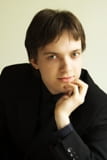 From May 26-29, the Paderewski Music Society in Los Angeles presented the American Paderewski Piano Competition (APPC) in downtown Los Angeles. This competition is open to pianists of any nationality between the ages of 16 to 32. All rounds of the Competition took place in Thayer Hall of the Colburn School of Music.
From May 26-29, the Paderewski Music Society in Los Angeles presented the American Paderewski Piano Competition (APPC) in downtown Los Angeles. This competition is open to pianists of any nationality between the ages of 16 to 32. All rounds of the Competition took place in Thayer Hall of the Colburn School of Music.
 The jury—comprised of Dr. Janet Favreau, Dr. Wojciech Kocyan, and Françoise Régnat—announced the following winners at the final Gala on Saturday, May 29:
The jury—comprised of Dr. Janet Favreau, Dr. Wojciech Kocyan, and Françoise Régnat—announced the following winners at the final Gala on Saturday, May 29:
- FIRST PLACE ($5,000): Piotr Kosinski, Age 21, Poland
- SECOND PLACE ($2,500): Gloria Campaner, Age 23, Italy
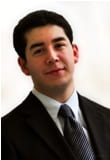 THIRD PLACE ($1,000): Leonard Gilbert, Age 19, Canada
THIRD PLACE ($1,000): Leonard Gilbert, Age 19, Canada- BEST PERFORMANCE OF PADEREWSKI: Gloria Campaner, Leonard Gilbert, and Piotr Kosinski (in alphabetical order)
- BEST PERFORMANCE OF CHOPIN ($1,000): Gloria Campaner – Award presented by the L’Association Chopin à Nohant, France
- BEST PERFORMANCE OF LESCHETYZKI ($1,000): Hsiang John Tu – Award presented by The Leschetyzki Music Society in Warsaw, Poland
- JURY’S CHOICE ($1,300): Nicholas King – Award presented by the Paderewski Music Association in Bydgoszcz, Poland. Includes one week of master classes for pianists playing piano concertos with the symphony orchestra of the Paderewski Piano Academy, Bydgoszcz, Poland.
In addition to the prizes listed above, the Paderewski Music Society of Los Angeles will provide selected finalists with airfare to Poland in order to take part in the International Paderewski Piano Competition in Bydgoszcz in November 2010. Winners of this award will be determined before the end of June 2010 in consultation with the organizers of the International Paderewski Piano Competition in Bydgoszcz and based on the finalists’ interest in participation in the Bydgoszcz Competition.
[Source: ijpaderewski.org]
Penderecka Honored at Yale U.
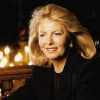 Elżbieta Penderecka, President of the Ludwig van Beethoven Association in Poland and wife of the great contemporary Polish composer, Krzysztof Penderecki, has been awarded the Samuel Simons Sanford Medal from Yale School of Music. The ceremony took place at an annual meeting of the Yale University School of Music on May 2. The medal, given for “for distinguished service to music,” was conferred by the Dean of the Yale School of Music, Prof. Robert Blocker.
Elżbieta Penderecka, President of the Ludwig van Beethoven Association in Poland and wife of the great contemporary Polish composer, Krzysztof Penderecki, has been awarded the Samuel Simons Sanford Medal from Yale School of Music. The ceremony took place at an annual meeting of the Yale University School of Music on May 2. The medal, given for “for distinguished service to music,” was conferred by the Dean of the Yale School of Music, Prof. Robert Blocker.
[Source: beethoven.org.pl]
Golden Orpheus For DUX
 On May 4, 2010 at a gala in the Amphitheater of the Opera Bastille in Paris, DUX records was honored with two of this year’s Orphée d’Or [Golden Orpheus] Awards, which are given by the French “Academie du Disque Lyrique.” Four albums released by DUX in 2009 were honored:
On May 4, 2010 at a gala in the Amphitheater of the Opera Bastille in Paris, DUX records was honored with two of this year’s Orphée d’Or [Golden Orpheus] Awards, which are given by the French “Academie du Disque Lyrique.” Four albums released by DUX in 2009 were honored:
Golden Orpheus – Oliver Messiaen Award for the best recording of choral music was awarded to Krzysztof Penderecki – Dzieła Chóralne(DUX0694).
Golden Orpheus – Arturo Toscanini Award for the best Phonographic Initiative was given for the promotion of works by Stanisław Moniuszko, via the following titles:
- Stanisław Moniuszko – Halka (DUX0538/0539), recorded by Wrocław Opera, conducted by Ewa Michnik
- Stanisław Moniuszko – Masses vol. 2 (DUX0720), recorded by National Philharmonic Choir, conducted by Henryk Wojnarowski
- Stanisław Moniuszko – Flis (DUX0736), recorded by Opera at the Castle, conducted by Warcisław Kunc.
[Sources: muzyka.onet.pl; dux.pl; thenews.pl]
Gloria Artis For Singers
 On May 24, during a ceremony in celebration of “The Day of the Singer,” the Secretary of State at the Ministry of Culture and National Heritage, Piotr Żuchowski, awarded the Gloria Artis Medals to deserving vocalists.
On May 24, during a ceremony in celebration of “The Day of the Singer,” the Secretary of State at the Ministry of Culture and National Heritage, Piotr Żuchowski, awarded the Gloria Artis Medals to deserving vocalists.
The ceremony, organized by the Society of the Polish Stage Artists and hosted Lech Czerkas, honored Joanna Cortés, Piotr Nowacki, Krystyna Starościk-Labuda, Alina Wieczorek-Januszewska and Jolanta Gzella, who all received the Bronze Gloria Artis Medals from Minister Żuchowski. Honorary Medals were also given to: Anna Teresa Czerska, Agnieszka Kossakowska – Fijałkowska and Halina Teliga.
[Source: mkidn.gov.pl]
Wojciech Kilar Honored
 Wojciech Kilar is this year’s recipient of the Lifetime Achievement Award at the 24th Tarnów Film Award festival. The award was given to Kilar on May 16 during a closing gala of the festival. During the festival the organizers presented 3 movies with the music by Wojciech Kilar.
Wojciech Kilar is this year’s recipient of the Lifetime Achievement Award at the 24th Tarnów Film Award festival. The award was given to Kilar on May 16 during a closing gala of the festival. During the festival the organizers presented 3 movies with the music by Wojciech Kilar.
Wojciech Kilar is an author of music to some 150 Polish and foreign movies. He joins the ranks of previous acclaimed recipients, such as: Andrzej Wajda, Janusz Morgenstern, Tadeusz Konwicki and Franciszek Pieczka.
The Tarnów Film Award is a festival of selected Polish feature films and is geared toward the promotion of Polish cinematography. Established 24 years ago, it is the second oldest film festival in Poland, after the Gdynia Film Festival.
[Source: pwm.com.pl]
Landowska Competition Results
 On May 23 the results of the Wanda Landowska Composition Competition, organized by the Fryderyk Chopin Music University, were announced. The jury, consisting of prof. Zbigniew Bagiński – chairman, prof. Leszek Kędracki, prof. Władysław Kłosiewicz, Aleksander Kościów, Miłosz Bembinow – secretary, has determined the following laureates:
On May 23 the results of the Wanda Landowska Composition Competition, organized by the Fryderyk Chopin Music University, were announced. The jury, consisting of prof. Zbigniew Bagiński – chairman, prof. Leszek Kędracki, prof. Władysław Kłosiewicz, Aleksander Kościów, Miłosz Bembinow – secretary, has determined the following laureates:
- I Prize for Klawitiuda awarded to Bartosz Kowalski
- II Prize ex aequo for Action Cembalo awarded to Marcin Łukaszewski and for La riña awarded to Filip Pinczewski
- III Prize not awarded
- Three honorary mentions were given to: [Toccata] – Krzysztof Kozłowski, Engram– Marcin Łopacki and KATAR(Z)YNKA W. PANDORZE – Jakub Polaczyk
The organizers and members of the jury wish to extend their gratitude to Dr. George E. Assousa, Chairman and Director of Multi-Technologies Group from London, for his primary sponsorship of the competition.
[Source: chopin.edu.pl, polmic.pl]
Tomaszewski Honored In Bydgoszcz
 On May 28 the Music Academy in Bydgoszcz honored Prof. Mieczysław Tomaszewski with a honoris causa doctorate. Tomaszewski, an outstanding Chopin scholar and head of the Department of Musical Work Theory and Interpretation at the Music Academy in Kraków, was honored during a celebration of the 200th birthday of Chopin. During the ceremony the provost of the school, Prof. Maria Murawska, remarked that Prof. Tomaszewski is currently the foremost Chopin scholar in the world. Prof. Irena Poniatowska presented the award, and the recipient gave a lecture titled Wokół prawdy i piękna, fantazji i ekspresji [Around the truth and beauty, fantasy and expression].
On May 28 the Music Academy in Bydgoszcz honored Prof. Mieczysław Tomaszewski with a honoris causa doctorate. Tomaszewski, an outstanding Chopin scholar and head of the Department of Musical Work Theory and Interpretation at the Music Academy in Kraków, was honored during a celebration of the 200th birthday of Chopin. During the ceremony the provost of the school, Prof. Maria Murawska, remarked that Prof. Tomaszewski is currently the foremost Chopin scholar in the world. Prof. Irena Poniatowska presented the award, and the recipient gave a lecture titled Wokół prawdy i piękna, fantazji i ekspresji [Around the truth and beauty, fantasy and expression].
This is the third honorary doctorate given by the Music Academy in Bydgoszcz. In April, a similar honor was given to Dang Thai Son, pianist and laureate of the International Chopin Piano Competition.
[Source: polmic.pl, obchody.chopin2010.pl; photo: chopin.nifc.pl]
Rubinstein’s Producer Honored
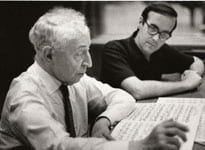 Max Wilcox, conductor and producer of recordings by renowned pianist Artur Rubinstein, was honored during a special concert at the Lincoln Center for Performing Arts in New York. The eighty year old Wilcox worked with Rubinstein for 17 years; together they recorded numerous albums and performed countless concerts, encompassing some of the greatest music in the classical canon. Recordings produced by Max Wilcox have received seventeen Grammy Awards, and he has received five for his own work as well.
Max Wilcox, conductor and producer of recordings by renowned pianist Artur Rubinstein, was honored during a special concert at the Lincoln Center for Performing Arts in New York. The eighty year old Wilcox worked with Rubinstein for 17 years; together they recorded numerous albums and performed countless concerts, encompassing some of the greatest music in the classical canon. Recordings produced by Max Wilcox have received seventeen Grammy Awards, and he has received five for his own work as well.
Ewa Junczyk-Ziomecka, Consul General of Poland in New York, read a congratulatory letter at the ceremony and included a remark from 65 years ago. At that time Rubinstein, who was invited to the first United Nations session, was disappointed that Poland had not been invited and started his concert with a performance of Polish National anthem, Dąbrowski’s Mazurka.
[Source: muzyka.onet.pl]
PSAA Hlond Trophy
 Every three years, member groups of the Polish Singers Alliance of America meet in various cities in the USA and Canada to hold business sessions, choral competitions, concerts, receptions and social reunions. Between May 27-30, the Buffalo and District IX of the PSAA hosted the 49th International PSAA Convention, noting the bicentennial and sesquicentennial birthdays of Frederic Chopin and Ignacy Jan Paderewski.
Every three years, member groups of the Polish Singers Alliance of America meet in various cities in the USA and Canada to hold business sessions, choral competitions, concerts, receptions and social reunions. Between May 27-30, the Buffalo and District IX of the PSAA hosted the 49th International PSAA Convention, noting the bicentennial and sesquicentennial birthdays of Frederic Chopin and Ignacy Jan Paderewski.
Established in Chicago in May 1889, it is the oldest of the continent’s Polonian cultural organizations, and in its 121 years, the PSAA has been “home base” to over 300 amateur singing societies. Members born in Europe or North America meet regularly to rehearse and sing in many languages: English, Latin and, of course, Polish. Their repertoire includes art songs, folk music, religious hymns and popular favorites.
On Saturday, May 29 at Cheektowaga’s Millenium Hotel, audiences heard ten PSAA choruses from Detroit, Brooklyn, New Jersey, Buffalo, Long Island and elsewhere, competing in male, female and mixed voice categories. Each group performed two Polish numbers (required and optional) before five independent judges. The highest overall point total is awarded the coveted Cardinal Hlond Trophy. This year’s winners were:
- ARIA Chorus #303, Mixed Choir from Wallington, NJ took home the Hlond Trophy (Grand Prix)
- OGINSKI Chorus #283 from Hempstead, NY won First Place in the Male Chorus Competition.
- JUTRZENKA SINGING SOCIETY #226, Female Chorus from Brooklyn, NY took Second Place in Female category.
First awarded in 1934, the Cardinal Hlond Trophy is a perpetually traveling prize and the PSAA’s highest symbol of choral supremacy. Named in honor of a late Primate of Poland, it is a silver cup, decorated with coronation medals and commemorative coins dating to the 16th century.
[Source: PSAA Press Release]
Festivals
Poland @ Schleswig-Holstein Festival
 The 25th anniversary edition of the Schleswig-Holstein Musik Festival, which will take place between June 23 and August 29 throughout the region of Schleswig-Holstein in Northern Germany, is dedicated to Polish music. Entitled “Poland in Pulse,” this year’s Festival will take audiences on a journey of discovery through the Polish musical landscape. The Festival encompasses the various genres of classical music, klesmer music and jazz. Throughout the 136 concerts scheduled during the festival, works by Polish composers will be performed by highly esteemed artists. Per Festival traditions, there will also be “word-music” sessions, during which actors will create melodic recitations of selected texts.
The 25th anniversary edition of the Schleswig-Holstein Musik Festival, which will take place between June 23 and August 29 throughout the region of Schleswig-Holstein in Northern Germany, is dedicated to Polish music. Entitled “Poland in Pulse,” this year’s Festival will take audiences on a journey of discovery through the Polish musical landscape. The Festival encompasses the various genres of classical music, klesmer music and jazz. Throughout the 136 concerts scheduled during the festival, works by Polish composers will be performed by highly esteemed artists. Per Festival traditions, there will also be “word-music” sessions, during which actors will create melodic recitations of selected texts.
The 25th Schleswig-Holstein Musik Festival will feature performances by such international stars as: Piotr Anderszewski, Rafał Blechacz, Ewa Podleś, Sinfonia Varsovia, Polish Radio Chamber Orchestra „Amadeus” with Agnieszka Duczmal, Apollon Musagete String Quartet, The Nigel Kennedy Quintet, Royal String Quartet, Leszek Możdżer, Waldemar Malicki, Kroke Ensemble, and Tomasz Stańko Quintet, among others. On August 24 the NDR Radiophliharmonie will be conducted by Krzysztof Penderecki, and on August 22 the concert performances of Halka by Stanisław Moniuszko will feature conductor Łukasz Borowicz, Iwona Sobotka (soprano), Urszula Kryger (mezzo-soprano), Vladimir Kuzmenko (tenor), Karol Kozłowski (tenor), Konrad Jarnot (baritone) and Jacek Janiszewski (bass).
A detailed program of the festival is available at: www.shmf.de
The Schleswig-Holstein Musik Festival was created in 1986. Each edition focuses on music of one country and presents music in unusual concert spaces like castles, villas, barns, churches or factory halls. Open-air concerts and music workshops for the youngsters are also a part of the festival. In 2002 Schleswig-Holstein Musik Festival was combined with the JazzBaltica festival.
Łańcuch VII Festival
 The Witold Lutosławski Society and Polish Radio Channel 2 have prepared the Witold Lutosławski Festival “Łańcuch VII,” which will take place in Polish Radio Witold Loutosławski Concert Studio in Warsaw on June 5 and 6. The two concerts prepared to celebrate the music of one of the greatest Polish composers will be performed by Polish Radio Chamber Orchestra “Amadeus” and Sinfonia Varsovia with Agnieszka Duczmal, Jerzy Maksymiuk and Krzysztof Jakowicz conducting.
The Witold Lutosławski Society and Polish Radio Channel 2 have prepared the Witold Lutosławski Festival “Łańcuch VII,” which will take place in Polish Radio Witold Loutosławski Concert Studio in Warsaw on June 5 and 6. The two concerts prepared to celebrate the music of one of the greatest Polish composers will be performed by Polish Radio Chamber Orchestra “Amadeus” and Sinfonia Varsovia with Agnieszka Duczmal, Jerzy Maksymiuk and Krzysztof Jakowicz conducting.
The first evening will feature music by Ignacy Jan Paderewski, Roman Maciejewski and Witold Lutosławski. The second concert will present the premiere of Jerzy Maksymiuk’s arrangement of Lutosławski’s Recitativo e arioso for violin and orchestra. Additionally there will be more works by the patron of the festival. Admission to the concerts is free.
For more information please visit www.lutoslawski.org.pl.
[Source: polmic.pl]
Mozart Festival
 The anniversary edition of Mozart Festival will be full of exceptional musical events, including oratorio and chamber concerts, famous singers, and performances of the complete catalog of stage works by Wolfgang Amadeus Mozart. The festival is being organized for the 20th time by the Warsaw Chamber Opera.
The anniversary edition of Mozart Festival will be full of exceptional musical events, including oratorio and chamber concerts, famous singers, and performances of the complete catalog of stage works by Wolfgang Amadeus Mozart. The festival is being organized for the 20th time by the Warsaw Chamber Opera.
From June 15 until July 26 the stage of the Warsaw Chamber Opera will host performances of the audience favorites as well as lesser known and incomplete stage works of Mozart. The designs for the operas were created over the years by late Andrzej Sadowski, lead designer and co-creator of the Warsaw Chamber Opera.
Part of the festival consists of symphonic concerts at the Great Hall of the Royal Castle in Warsaw performed by the period instrument ensemble “Musicae Antiquae Collegium Varsoviense.” The performance of Mozart’s Mass in C Minor KV 427 and Requiem will take place in the Seminary Church. Chamber concerts will be performed by “Musicae Antiquae Collegium Varsoviense” in the White Hall of the Łazienki Palace, including quartets, trios and sonatas by Mozart on classical period instruments.
The Mozart Festival was first organized in 1991 by Warsaw Chamber Orchestra to celebrate the Mozart Year. It is the only festival in Europe which presents complete the stage works catalog of the Viennese Master. For a detailed program and more information, please visit the Warsaw Chamber Opera website.
[Source: culture.pl]
Focus: Józef Wiłkomirski
Józef Wiłkomirski Autobiography
 On May 15, 2010, Maestro Józef Wiłkomirski—conductor, composer, cellist, educator, writer, and an ardent book-lover—celebrated his 84th birthday. On this occasion, his world famous sister, the legendary violinist Wanda Wiłkomirska, paid a short visit to Wałbrzych in south-western Poland. Both widely respected and equally famous, the musical siblings delighted an enthusiastic crowd of admirers at the “Garden of Arts” Gallery in Szczawno-Zdrój, a spa town in Wałbrzych County. On the same day, Józef Wiłkomirski dedicated and autographed many copies of his newly published memoires.
On May 15, 2010, Maestro Józef Wiłkomirski—conductor, composer, cellist, educator, writer, and an ardent book-lover—celebrated his 84th birthday. On this occasion, his world famous sister, the legendary violinist Wanda Wiłkomirska, paid a short visit to Wałbrzych in south-western Poland. Both widely respected and equally famous, the musical siblings delighted an enthusiastic crowd of admirers at the “Garden of Arts” Gallery in Szczawno-Zdrój, a spa town in Wałbrzych County. On the same day, Józef Wiłkomirski dedicated and autographed many copies of his newly published memoires.
Entitled Lata 1926-2006: Wspomnienia nie tylko muzyczne [Years 1926-2006: Remembering not only music], Wilkomirski’s two-volume autobiography was published in 2009, thanks to the collective efforts of the members of the Stowarzyszenie Inteligencji Twórczej [Association of Creative Intellectuals] in Wałbrzych and its chairwomen, Elżbieta M. Kokowska. The book is in Polish, and is beautifully illustrated with memorable photos and documents. (See more publication details below)
At the beginning of 2006, after sixty years of professional life, Józef Wiłkomirski had officially retired from his artistic activities. Encouraged by his wife Małgorzata Wiłkomirska, acclaimed choirmaster, and his daughter Wiosna [Spring], he began to write his memoires. As the title suggests, the purpose of this book was to give the background of his life beyond the music and to describe the historical, political and social situation in Poland between the two world wars and present-day Poland. It is also a formidable homage to his teachers and to the many people who touched his life during the years.
Józef Wiłkomirski was born in Kalisz on May 15, 1926, to a prominent musical family in Poland. His father, Alfred Wiłkomirski (1873-1950)—a highly educated musician, violin-virtuoso and pedagogue—had returned from Russia after the Bolshevik Revolution to a newly Independent Poland. Unable to make a decent living in Warsaw, he settled in Kalisz with his wife, Aniela Kułassowska, and three children: Kazimierz Wiłkomirski (1900-1995), mentor to many Polish cellists and notable composer; Michał Wiłkomirski (1902-1986), violinist and concertmaster of the WGN Radio Orchestra in Chicago; and Maria Wiłkomirska (1904-1995), distinguished pianist and pedagogue.
From 1920, Alfred Wiłkomirski held directorial and teaching positions at Kalisz Music School. In 1921, his first wife Aniela passed away. Not long after, the forty-eight year old Alfred Wiłkomirski married Dorota Temkin, a twenty year old violin student from a rich Jewish family. In the next years he went with his young wife to Lublin, Warsaw and then to Łódź. From this second marriage were born two siblings: Józef Wiłkomirski and Wanda Wiłkomirska (born January 11, 1929, in Warsaw).
At an early age, Józef Wiłkomirski began his musical education under the tutelage of his father and later at the Music Conservatory. The outbreak of war in 1939 ended his education. Eighteen years old, he was a member of the underground Polish Home Army [Armia Krajowa] during the Warsaw Uprising in 1944, and after capitulation, he was deported to a German camp for prisoners of war in Sandbostel, Stalag X B.
Starting in 1946 after the end of war, he played cello in the Philharmonic Orchestra at Łódź and in the Opera Orchestra in Warsaw. In 1950 he obtained a diploma at the State Music High School (now the Music Academy) in Warsaw and made his conducting début with the Warsaw Symphony Orchestra in the same year. From 1950-1951 he was a conductor in Kraków, and from 1954-1957, he served as conductor at the Poznań Philharmonic Orchestra. From 1957 to 1971, Józef Wiłkomirski was appointed conductor and music director at the Szczecin Philharmonic Orchestra, the youngest artistic manager in Poland. Due to political reasons, conflicts, controversy, blackmails, innuendos and gossipers, he left his position, and for the next seven years worked only as a guest artist. Finally he moved to Wałbrzych where he found new opportunities; for him it was neither a time of exile nor a time of banishment, but a time for a chain of extraordinary events and challenges. In 1978 he founded and organized the Sudeten Philharmonic Orchestra, where he remained its Chief Manager and Artistic Director for twenty-eight years.
For those who were fortunate enough to meet Maestro Wiłkomirski, the expressions of their gratitude are unlimited. I was one of his close collaborators and I take this opportunity to call him my friend. I first met Józef Wiłkomirski in May, 1963, during my tenure as a substitute harpist for my ill harp teacher, Krysta Zemancova, at the Poznań Philharmonic Orchestra. During the following months, I auditioned for his orchestra and became a member of the Szczecin Philharmonic Orchestra (1964-1972) and a solo harpist with Szczecin Chamber Orchestra. From 1969, I began my career as a soloist, touring with Józef Wiłkomirski to concert halls across Poland, Romania, Germany and the Czech Republic. On June 12-13, 1971, at Olsztyn and Szczytno in Poland, I premiered Józef Wiłkomirski’s Concertino for Harp, composed in 1969—as of today I am the sole performer of this piece. I also played Wiłkomirski’s arrangement for solo harp and chamber orchestra of José Blanco’s Organ Concerto, which I recorded in Sibiu, Romania.
During my six years (1972-1978) as principal harpist at the Imperial Opera Orchestra in Tehran, Iran, I performed Wiłkomirski’s Sketches and Miniatures after Divan Ghazaliyatby Hafiz; Three pieces for Harp Solo: Seven Roses from Shiraz, composed in 1973; Three Persian Miniatures: A girl reading poetry, composed in 1973 for harp, flute and percussion; Three Songs of Zarathustra: Fight against Angra Mainyu, Hymn to Fire and Victory of Ahura Mazda, composed in 1974 for harp, flute and percussion; and Preludium II for Harp Solo: Świt w lesie [Dawn in the Forest], composed in 1971. These performances—dated May 23, 1973; June 23, 1973; June 22, 1974, and January 22, 1977—took place in Tehran’s various venues and at the Opera House-Talare Roudaki.
On his birthday, we wish Maestro Wiłkomirski many happy returns, good health and much more success, as well.
 Józef Wiłkomirski: Lata 1926-2006: Wspomnienia nie tylko muzyczne(2 volumes). Published by Stowarzyszenie Inteligencji Twórczej, 2009. Jacek Ślaziński, Stowarzyszenie Inteligencji Twórczej,Wałbrzych, Phone: (48) 602-753-485, E-mail: jaceksla@op.pl.
Józef Wiłkomirski: Lata 1926-2006: Wspomnienia nie tylko muzyczne(2 volumes). Published by Stowarzyszenie Inteligencji Twórczej, 2009. Jacek Ślaziński, Stowarzyszenie Inteligencji Twórczej,Wałbrzych, Phone: (48) 602-753-485, E-mail: jaceksla@op.pl.
For more information in Polish, including a complete list of Józef Wiłkomirski compositions and short biography, please visit: www.culture.pl, www.filharmonia-sudecka.pl , or www.polmic.pl.
© Liliana Osses Adams
California, May 15-17, 2010
Liliana Osses Adams was born at Poznań, Poland, where she began her music education at the age of seven. She received her Master of Arts degree from Poznan Music Academy and began her professional career as an orchestra member and a harp soloist. At the present she resides in the San Francisco Bay Area where she is active in the music teacher’s community and in Polish cultural and pastoral centers. She contributes articles, essays and poetry to magazines, journals and internet websites and is listed in several Who’s Who editions in USA, UK, India, France and Poland.
Performances
Penderecki Conducts Penderecki
So acute is [Penderecki’s] ear for orchestral sound and so clever his manipulation of it that wood, metal and string take on an anthropomorphic quality.
–Bernard Holland, The New York Times
 On April 29, the Yale School of Music presented a free concert entitled “Penderecki Conducts Penderecki” in Yale’s Woolsey Hall in New Haven, CT. Krzysztof Penderecki (pictured at right during a rehearsal at Yale), one of the most influential and prolific composers of our time, made a rare New Haven appearance conducting the Philharmonia Orchestra of Yale and faculty soloists William Purvis, horn, and Syoko Aki, violin. The program featured four of the composer’s most important orchestral works, from the early and groundbreaking work Threnody to the Victims of Hiroshima to the New Haven premiere of the 2008 Horn Concerto.
On April 29, the Yale School of Music presented a free concert entitled “Penderecki Conducts Penderecki” in Yale’s Woolsey Hall in New Haven, CT. Krzysztof Penderecki (pictured at right during a rehearsal at Yale), one of the most influential and prolific composers of our time, made a rare New Haven appearance conducting the Philharmonia Orchestra of Yale and faculty soloists William Purvis, horn, and Syoko Aki, violin. The program featured four of the composer’s most important orchestral works, from the early and groundbreaking work Threnody to the Victims of Hiroshima to the New Haven premiere of the 2008 Horn Concerto.
The “acute ear for orchestral sound” that so struck Bernard Holland of the New York Timesin his 1986 review was showcased in the Yale program that spanned nearly a half century of composition. In addition to the Threnody for the Victims of Hiroshima (1960) and Symphony No. 4 (1989), violinist Aki was reunited with Penderecki and the orchestra in the Capriccio for Violin and Orchestra (1967), which they performed at Yale in 1977, and Purvis played the solo in the Concerto for Horn and Orchestra “Winterreise” (2008).
With a career that spans nearly five decades, Penderecki is one of the pioneering composers of the modern day. He was an iconic figure of the 1960s avant-garde and remains a vibrantly vital voice in contemporary music. His numerous awards include the UNESCO Award for Threnody and the Grawemeyer Award for the Symphony No. 4. Penderecki has a longstanding relationship with Yale; he served on the faculty of the School of Music from 1973 to 1979 and returned in 2005 to conduct his choral work Credo.
[Above paragraphs were adapted from the press release, “Penderecki Conducts Penderecki: The master of contemporary music leads the Yale Philharmonia” from the Yale School of Music news blog]
This concert was reprised on April 30 in the Stern Auditorium of Carnegie Hall, as part of Carnegie’s “Yale New York” series, serving as the New York premiere of the Horn Concerto “Winterreise.” In her laudatory review for The New York Times, Vivien Schweitzer wrote that “[t]he only disappointing aspect of the program was the low turnout to see an important composer conduct a fascinating retrospective of his works.” Read the entire article, “An Avant-Gardist Turned Less So,” here.
[Photo credit: Vincent Oneppo, Yale School of Music blog]
Szymczewska, Lisiecki In Seoul

 A cooperative relationship between the Ludwig van Beethoven Association in Poland and the Seoul International Music Festival has produced some excellent opportunities for Polish musicians. On May 25th, Agata Szymczewska performed in Seoul during the Festival. Her concert of chamber music at Kumho Art Hall included works by Mahler, Schnittke, and Shostakovich. The artist also conducted a 5-day master classes with students of the violin, ending in a joint concert by participants and teachers.
A cooperative relationship between the Ludwig van Beethoven Association in Poland and the Seoul International Music Festival has produced some excellent opportunities for Polish musicians. On May 25th, Agata Szymczewska performed in Seoul during the Festival. Her concert of chamber music at Kumho Art Hall included works by Mahler, Schnittke, and Shostakovich. The artist also conducted a 5-day master classes with students of the violin, ending in a joint concert by participants and teachers.
Also on May 23rd there was a Festival concert given by Jan Lisiecki, a 15-year-old pianist from Calgary of Polish origin. The artist performed F. Chopin’s Piano concerto in F minor accompanied by the Suwon Philharmonic Orchestra under Daejin Kim.
[Source: beethoven.org.pl]
Poland At Expo 2010
Polish Gala
 The Polish Gala was the most important cultural event of the Polish participation in the World EXPO 2010 in Shanghai, China. To celebrate Polish National Day at the exhibition, the Adam Mickiewicz Institute prepared a concert performed by Ewa Pobłocka, laureate of the 10th International Chopin Piano Competition in Warsaw in 1980, and Zhejiang Symphony Orchestra, conducted by Krzysztof Herdzin. The artists performed at the Shanghai Grand Theater, the most prestigious stage in the heart of the city.
The Polish Gala was the most important cultural event of the Polish participation in the World EXPO 2010 in Shanghai, China. To celebrate Polish National Day at the exhibition, the Adam Mickiewicz Institute prepared a concert performed by Ewa Pobłocka, laureate of the 10th International Chopin Piano Competition in Warsaw in 1980, and Zhejiang Symphony Orchestra, conducted by Krzysztof Herdzin. The artists performed at the Shanghai Grand Theater, the most prestigious stage in the heart of the city.
The first part of the concert was filled with a Chopin recital performed by Ms. Pobłocka and the evening concluded with selections of Polish film music performed by Zhejiang Symphony Orchestra under the baton of Krzysztof Herdzin. Some of the most well known themes by Polish composers were presented, including: Ziemia obiecana (dir. Andrzej Wajda, music: Wojciech Kilar), The Pianist (dir. Roman Polański, music: Wojciech Kilar), and Finding Neverland [Marzyciel] (dir. Marc Foster, music: Jan A.P. Kaczmarek), among many others.
During the concert, VJ Krzysztof Łuka created live video mixes using fragments of the movies and live shots of the concert audience and orchestra.
For more information about Polish National Day at the Shanghai EXPO 2010 please visit en.expo2010.cn.
[Source: culture.pl]
Let’s dance Chopin
 On May 22, the world premiere of Let’s dance Chopin took place at the Shanghai EXPO 2010. Janusz Stokłosa is the creator and conductor of the project and Maria Stokłosa directed and choreographed the show.
On May 22, the world premiere of Let’s dance Chopin took place at the Shanghai EXPO 2010. Janusz Stokłosa is the creator and conductor of the project and Maria Stokłosa directed and choreographed the show.
The musical layer of the show is inspired by Chopin’s Sonata No. 3 in B Minor. According to Janusz Stokłosa: “The choice was very hard, I could not make up my mind for a long time. The composition is supposed to last for 45 minutes. Had I chosen the popular mazurkas or preludes I would have had to use at least ten of them. That would be quite a mess. The will to show that the grand and arguably ‘hard’ works of Chopin can also be intimate and touching prevailed. This is why I decided on the special, less well known work, however extremely beautiful and deep.”
The project included five famous polish studio session musicians: Mariusz “Fazi” Mielczarek, Tomasz Filipczak, Artur Lesicki, Mirosław Wiśniewski i Radosław Maciński. The musicians were accompanied by Sinfonia Iuventus orchestra. The stage was equally shared by 12 dancers from around the world and musicians.
The spectacle was produced by the National Frederic Chopin Institute.
Let’s Dance Chopin – Sonata for symphonic orchestra, jazz quintet and 12 dancers on the motives of Sonata in B Minor op. 58 by Frederic Chopin. Music: Janusz Stokłosa, Direction and Choreography: Maria Stokłosa, video: Dan Farberoff, lighting: Ewa Garniec, sound: Jarosław Regulski, stage design: Marek Chowaniec, costumes: Anna Kuczyńska, dramatist: Peter Pleyer, conductor and artistic director: Janusz Stokłosa. Dancers: A. Borys, M. Mavridou, R. Nagabczyńska, M.R. Raumanni, I. Szostak, D.A. Almgren Recen, M. Baldemar, I. Goldstein, K. Haselbeck, R. Martins de Oliveira, M. Raczyński. Musicians: T. Filipczak, R. Maciński, M. “Fazi” Mielczarek, A. Lisiecki, M. Wiśniewski and Polish Orchestra Sinfonia Iuventus.
[Source: culture.pl; Photo by Mateusz Majchrzak]
Discography
Szymanowski Solo Piano Works
Karol Szymanowski: Works for Solo Piano
Karol Szymanowski: Sonata No. 3, op. 36; Four Etudes, op. 4; Metopy [Metopes], op. 29; and Maski [Masques], op. 34
Emily White, piano
Arabesque Recordings Z6807
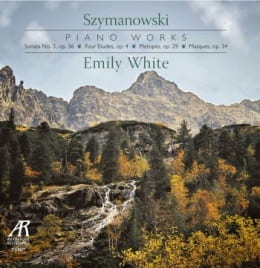 Emily White approaches the solo piano works of renowned Polish composer Karol Szymanowski with great care and precision. She manages to coax vivid emotions from the depths of the piano and clearly grasps Szymanowski’s musical intent. With her fingers gliding over the piano keys, occasionally punctuating notes that highlight extravagant passages, Ms. White manages to draw the audience in and hold their attention. This deeply moving performance of Szymanowski piano works is unrivaled and a welcome addition to the Arabesque catalog. [Chaim Roberts, Arabesque Recordings PR]
Emily White approaches the solo piano works of renowned Polish composer Karol Szymanowski with great care and precision. She manages to coax vivid emotions from the depths of the piano and clearly grasps Szymanowski’s musical intent. With her fingers gliding over the piano keys, occasionally punctuating notes that highlight extravagant passages, Ms. White manages to draw the audience in and hold their attention. This deeply moving performance of Szymanowski piano works is unrivaled and a welcome addition to the Arabesque catalog. [Chaim Roberts, Arabesque Recordings PR]
A standing-room-only, all-Chopin début at Weill Recital Hall, Carnegie Hall moved The New York Times reviewer Allan Kozinn to comment that Emily White had “captured the almost improvisational quality that is the mark of great Chopin playing.” Ms. White’s international career has taken her to London’s Wigmore Hall and South Bank Centre, the Queen’s Hall in Edinburgh, Saint David’s Hall in Cardiff, the Palais de l’Athénée in Geneva, and to Belgium, Italy, and Eastern Europe, as well as throughout the United States and Canada. In October of 2009, she performed Szymanowski’s Don Juan’s Serenade in a Polish music gala honoring presenter Jan Sporek at Isaac Stern Auditorium, Carnegie Hall. Emily White is a Steinway Artist. [Continue reading Ms. White’s biography here]
Recent Panufnik Releases
The following list of recent releases of the music of Polish composer Andrzej Panufnik (1914-1991) was submitted by Armin Berger of the University of Innsbruck.
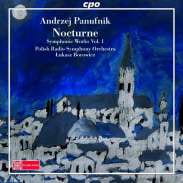 Andrzej Panufnik – Orchesterwerke
Andrzej Panufnik – Orchesterwerke
Andrzej Panufnik (1914-1991): Tragic Overture; Nocturne; Heroic Overture; Katyń Epitaph; A Procession for Peace; and Harmonie
Polish Radio Symphony Orchestra, Lukasz Borowicz – conductor
Classic Produktion Osnabrück (cpo)
This new recording is the first in an upcoming complete edition series of Panufnik’s works.
 Andrzej Panufnik: Arbor Cosmica
Andrzej Panufnik: Arbor Cosmica
Andrzej Panufnik (1914-1991): Arbor Cosmica and Violin Concerto
Robert Kabara – violin, Wojciech Michniewski – conductor, Sinfonietta Cracovia
DUX 0254
This album was released in 1995 and nominated for Fryderyk Award in 1996.
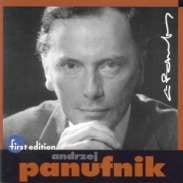 Andrzej Panufnik – Sinfonia Elegiaca
Andrzej Panufnik – Sinfonia Elegiaca
Andrzej Panufnik (1914-1991): Sinfonia Elegiaca; Nocturne; and Rhapsody
Louisville Orchestra, Robert S. Whitney – conductor
First Edition FECD-0017
FECD-0017 collects the Louisville [Orchestra] recordings of Andrzej Panufnik (1914-1991) – a composer little heard in recent years, yet whose music unites heart and brain in a personal and convincing manner. There are few more passionate remembrances of the Second World War than Nocturne (1947) – his biggest public (as opposed to ‘official’) success in post-war Poland, outlining a journey from numbed silence to implacable force and back with absolute formal poise. This Louisville account is only slightly less assured than a later Unicorn recording with Jascha Horenstein and the LSO, and the remaining works have yet to be re-recorded. Rhapsody (1956) is the first – and, at this stage in the composer’s career, slightly tentative – exploration of geometric consistency in matters of form that became crucial to Panufnik’s thinking a decade on; here combined with Polish dance inflections that find uneasy alliance with the abstraction elsewhere. Sinfonia Elegiaca (1957) is the second of the composer’s ten symphonies, whose three movements centre on a savage scherzo that balances the plangent expressiveness of those movements either side. Just why so finely-conceived and deeply communicative a work remains so little known is hard to fathom. [quoted from a 2006 review by Richard Whitehouse on classicalsource.com]
 Andrzej Panufnik – Sinfonia di Sfere
Andrzej Panufnik – Sinfonia di Sfere
Andrzej Panufnik (1914-1991): Sinfonia di Sfere and Sinfonia Mistica
London Symphony Orchestra, David Atherton – conductor
Explore Records EXP 0014
Recorded in 1978, this album was first released on Decca’s HEAD label in 1979 and then re-released internationally on Explore Records in 2006.
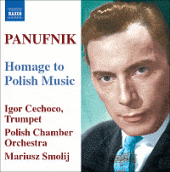 Panufnik: Hommage to Polish Music
Panufnik: Hommage to Polish Music
Andrzej Panufnik (1914-1991): Old Polish Suite; Concerto in modo antico; Jagiellonian Triptych; and Hommage a Chopin
Igor Cecocho – trumpet, Hanna Turonek – flute, Polish Chamber Orchestra, Mariusz Smolij – conductor
Naxos 8.570032 (2006)
This disc contains all of Panufnik’s post-war reconstructions of early Polish music originally written between the 14th and 18th centuries. Of these works the composer himself wrote: “My compulsion to restore some of the early Polish music was engendered as I witnessed the superb reconstruction of beautiful 16th and 17th century houses in the old part of Warsaw… My intention was to bring alive the spirit of Poland at that time, and to make use of these precious fragments which otherwise would have remained lifeless on the bookshelves of libraries…” The disc concludes with Hommage a Chopin, in which the composer draws on the folk music of Masovice, the region in central Poland where Chopin was born. [quoted from naxos.com]
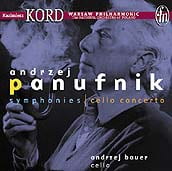 Andrzej Panufnik – Symphonies / Cello Concerto
Andrzej Panufnik – Symphonies / Cello Concerto
Andrzej Panufnik (1914-1991): Symphony No. 3 “Sinfonia sacra”; Symphony No. 10; Cello Concerto
Andrzej Bauer – cello, Warsaw Philharmonic, Kazimierz Kord – conductor
CDAccord ACD072 (2001)
The music of Panufnik – one of the greatest Polish composers of the 20th century – has returned to concert halls around 1977, when the artist’s name was taken off the government black list. The works on this album are particularly significant in Panufnik’s career. The Sinfonia Sacra, probably his most famous work, marks an important turn in his life. And the Tenth Symphony and the Cello Concerto are his last compositions which crown his rich artistic output. [quoted from cdaccord.com.pl]
Lutosławski Opera Omnia
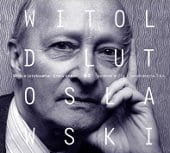 Witold Lutosławski – Opera Omnia vol. 2
Witold Lutosławski – Opera Omnia vol. 2
Witold Lutosławski: Symphony no. 2; Symphony no. 4
Wrocław Philharmonic Orchestra, Jacek Kaspszyk – conductor
ACD161
The second in a series of recordings of the complete works of Witold Lutosławski focuses on his symphonic oeuvre. Symphonies no. 2 and 4 are considered some of Lutosławski’s greatest works and make a great follow-up to the Opera Omnia vol. 1 recording of chamber music selections.
New from DUX
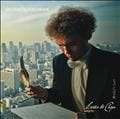 Letter to Chopin
Letter to Chopin
Michał Sobkowiak: Paraphrases on Chopin Mazurkas – E Minor Op. 17 no. 2; G Minor Op. 67 no. 2; C Minor Op. 56 no. 3; C sharp Minor Op. 63 no. 3; A flat Major Op. 41 no. 3; C Major Op. 33 no. 2; A Minor Op. 59 no. 1; B flat Minor Op. 24 no. 4; F Major Op. 68 no. 3; Letter to Chopin
Michał Sobkowiak – piano
DUX0765
 Dariusz Przybylski Utwory na orkiestre
Dariusz Przybylski Utwory na orkiestre
Dariusz Przybylski: Óneiros – Concerto for Violin and String Orchestra; Even stars cry with those who cry at night for String Orchestra and Percussion; Hommage a Josquin – Concerto for Flute, String Orchestra, Percussion and Electronic Sounds; Orchesterstück nr. 2 for Symphony Orchestra
Jadwiga Kotnowska – flute; Janusz Wawrowski – violin; Aukso Chamber Orchestra; Sinfonia Iuventus; Marek Moś – conductor; Krzysztof Słowoński – conductor
DUX0721
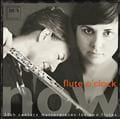 Now
Now
Bruno Maderna: Dialodia; Edison Denisov: Sonata for two flutes; Toru Takemitsu: Masque; Yoshihisa Taira: Synchronie; Diego Luzuriaga: Tierra…tierra…
Flute o’clock duo – Karolina Balińska, Ewa Liebchen – flutes |
DUX0715
Anniversaries
Born This Month
- June 1, 1909 – Maria DZIEWULSKA, composer and theoretician (d. 2006)
- June 4, 1845 – Aleksander POLIŃSKI, music historian (d. 1916)
- June 4, 1784 – Adam CZARNOCKI, music ethnographer (d. 1825)
- June 5, 1865 – Felicjan SZOPSKI, composer and music critic (d. 1939)
- June 6, 1929 – Bogusław SCHAEFFER, composer, writer
- June 12, 1897 – Aleksander TANSMAN, composer and pianist,
- June 16, 1923 – Henryk CZYŻ, conductor and composer
- June 17, 1930 – Romuald TWARDOWSKI, composer
- June 28, 1895 – Kazimierz SIKORSKI, composer and teacher
- June 28, 1904 – Włodzimierz POŹNIAK, musicologist
Died This Month
- June 1, 1869 – Jozef DULEBA, pianist and participant of January Uprising, died in a duel (b. 1843)
- June 3, 1904 – Daniel FILLEBORN, singer and performer of main parts in Moniuszko’s operas (b. 1841)
- June 4, 1872 – Stanislaw MONIUSZKO, Father of Polish National opera (b. 5 May 1819)
- June 5, 1964 – Henryk SZTOMPKA, pianist, Chopin specialist, teacher
- June 9, 1932 – Natalia JANOTHA, pianist and composer, student of Clara Wieck-Schumann, Royal Pianist in London, 400 opus numbers (b. 1856)
- June 10, 1953 – Grzegorz FITELBERG, conductor, composer, great promoter of new music, esp. Szymanowski (b. 1879)
- June 28, 1938 – Ludwik DRZEWIECKI, pianist and father of Zbigniew Drzewiecki
- June 29, 1945 – Kazimierz GARBUSINSKI, pianist, organist, composer
- June 30, 1957 – Michal SWIERZYNSKI, composer and choral conductor
